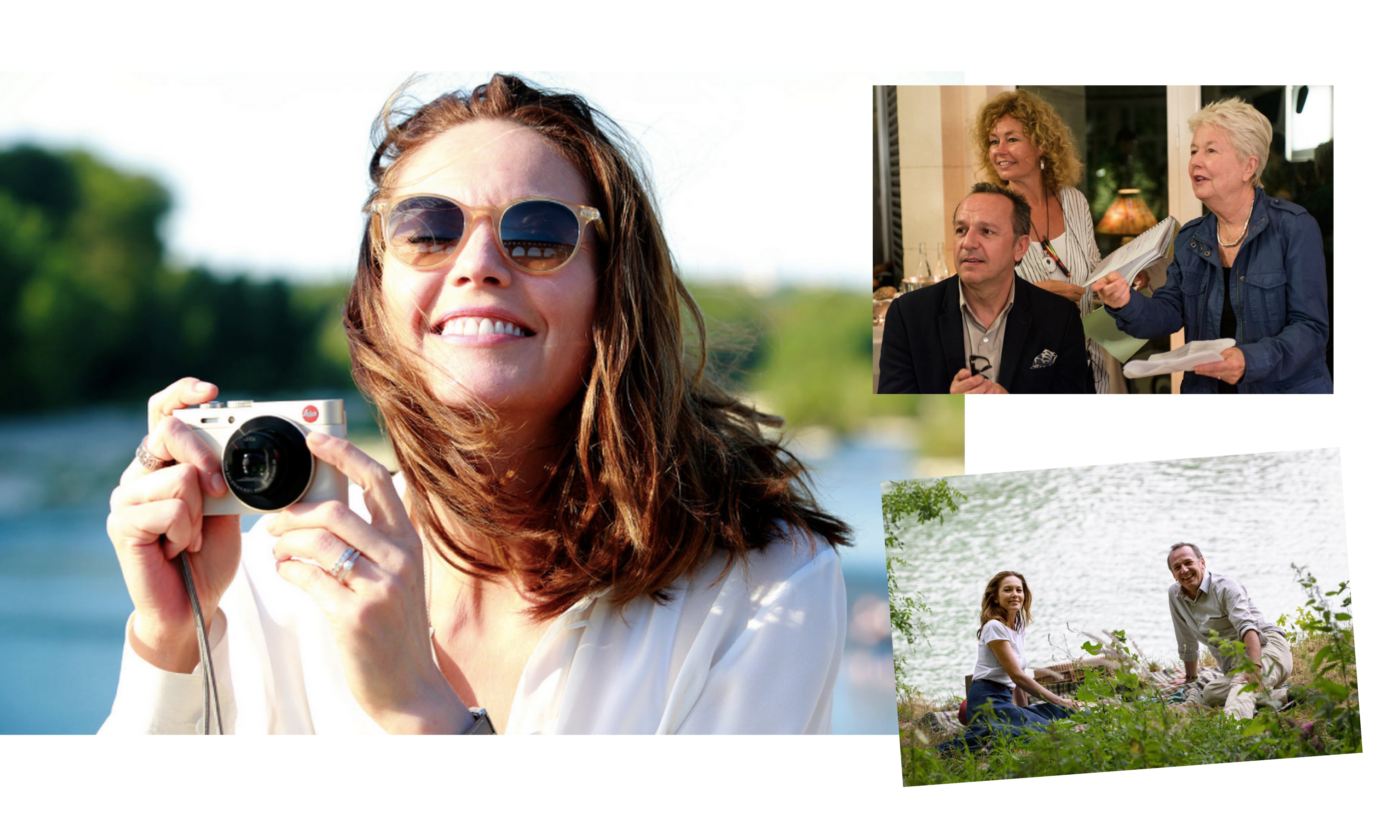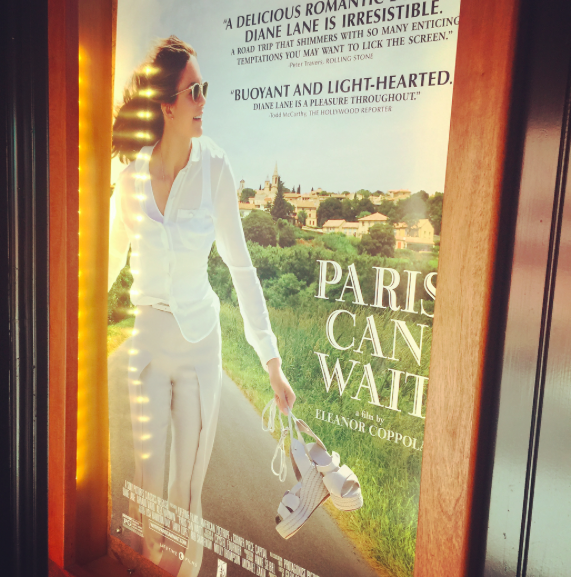Tue, 16 April 2024
"We are not born with the secret of how to live [well], and too many of us never learn it. There is nothing cold-blooded or mechanical about it, but there are many things we have to learn to do . . . the first thing is to realize we've probably been looking in the wrong place. The source is not outside us; it is within." —Mildred Newman & Bernard Berkowitz, authors of How to Be Your Own Best Friend Befriend yourself and you have a friend for life. This simple saying, often expressed, while true, is often not understood as to how it can be possible. But the most awesome news I want to share with you today is that you have had the answers to so much of the peace, calm, and clarity you have been seeking traveling within you all this time. How to tap into and what exactly are you looking for? That is what we are going to talk about today. Inspired by a book that was written in 1971 Mildred Newman and her husband, both psychologists, Bernard Berkowitz, the title was originally How To be Your Own Best Friend: A Conversation With Two Psychoanalysts. Consisting of only 74 pages, their insights are shared, as this title suggests, in conversation form - questions followed by answers. While little known when the couple originally self-published, it was with the help of author, screenwriter and director Nora Ephron, who upon reading the book quite liked it so she introduced the authors to her book agent upon which it then became a national bestseller (learn more about how she helped in this article published earlier this year). Picking up my own copy and zooming through it, I found common sense advice, grounded in approachable guidance sharing reminders and nudges of how we can help ourselves out but often are too timid to do so due to a variety of cultural circumstances and pressures. As I read, the overlap of choosing to be your best friend and finding and experiencing contentment quickly became apparent, and having just wrapped up producing all of the filmed lessons for TSLL's Contentment Masterclass, as you will discover when you enroll, knowing ourselves and honoring what we find to be true for ourselves resides at the core of a fulfilling life. In the words of the authors, becoming our best friend is sage wisdom to follow. However, what does that look like? Being our own best friend? That's what I want to share with you today and the benefits of doing so. Let's get started.
View the Show Notes on the blog: https://thesimplyluxuriouslife.com/podcast379 |
Tue, 31 October 2023
A quiet confidence, an ease of being. A deep joy of living each day. To consciously find ourselves in any of the three states of being above, it will have taken much intentionality, effort, patience and compassion. As well as strength, courage, kindness and trust. And these are all actions given to ourselves, let alone to the people and environments we engage with along the way to reach each or all of the aforementioned states. However, as Steve Jobs succinctly shares above, once you arrive at the simplicity, you have gone through much complex exploration, and it is because you have gone through that exploration that you know, absent of ignorance, that indeed what that true simplicity is and how to attain it. It is then at that point you really set yourself free and yes, his metaphor is apt - you will be able to do things you may have never thought possible, experience things you once thought only resided in your dreams. When The Simple Sophisticate podcast premiered back in September 2014, in the first episode, we dove right into sharing the eight pillars of living simply luxuriously (the most downloaded episode in the show's history); however, I think we are long overdue for sharing exactly what constitutes someone who is a simple sophisticate. And while I concisely shared a definition on the podcast page: The simple sophisticate is someone who prefers quality over quantity, sensible living over mindless consumption, personal style instead of trendy fashions, has an insatiable curiosity for life’s endless questions and a desire to live a truly fulfilling life rather than being led around by the nose, and the term itself 'simple sophisticate' has simple in its title, but it is in fact a complex concept, a destination and a way of living that takes time at which arrive; however, once we arrive and attain clarity in the understanding of what a simple sophisticate is and experience it first hand, the benefits, the elevation of the quality of our life, we then wholeheartedly understand the invaluable, yes, complex journey of self-discovery and self-growth we needed to travel in order to arrive at a state of being a simple sophisticate. And similarly to living a simply luxuriously life, the pillars for being a simple sophisticate are concrete, but how each of us embodies and welcomes them into our lives will be unique to our own life journey, and nobody will be exactly the same. So to be clear, a simple sophisticate is not a simpleton, and in fact, polar opposite of such a descriptor. A Simple Sophisticate, as we will share in detail below, chooses and acknowledges that many lessons and skills are needed to be able to experience the deep contentment within, but in accepting this truth, now has a focus that will lead through the temporary complex journey in order to arrive at a state of simplicity, a dynamic resting place of clarity, inner peace and a quiet confidence in how you go about your daily life. So remember . . . "Simplicity does not precede complexity, but follows it." —Alan Perlis And it will indeed follow it if you are willing to grow, to stretch, to explore, to let go of control and find comfort in uncertainty. Let's take a look at the 14 characteristics of a simple sophisticate:
Direct download: 368SimpleSophisticate14characteristics.m4a
Category:happiness -- posted at: 8:00pm PDT |
Tue, 1 August 2023
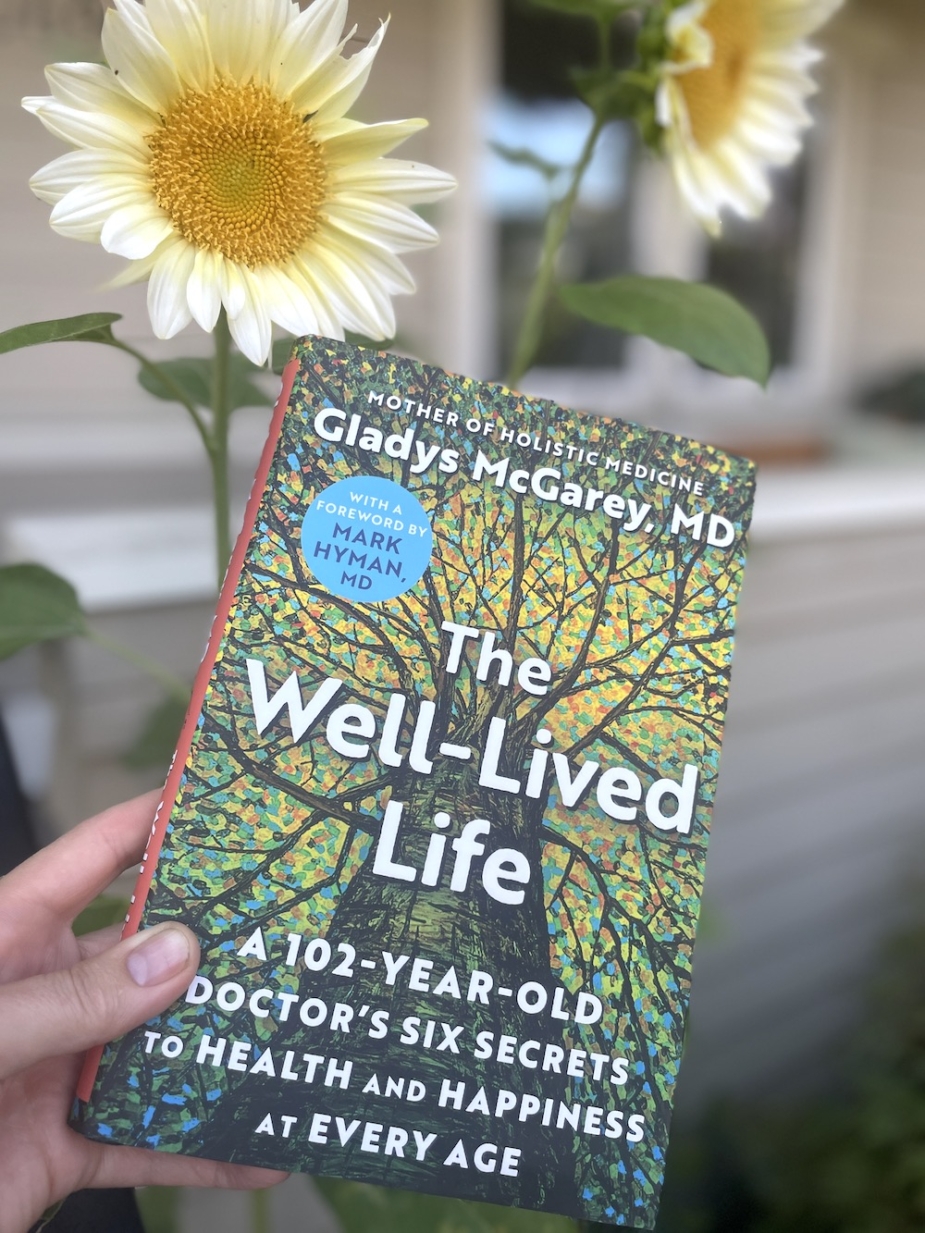
"I still have yet to discover a secret ingredient that has been proven to ensure a long and healthy life—well, not one you can put into a blender, anyway. But I can help you discover the secrets of true health and happiness . . . they're based on a simple shift in perspective."—Gladys McGarey, MD, author of The Well-Lived Life: A 102-year-old doctor's six secrets to health and happiness at every age Born in 1921, Dr. Gladys McGarey's life journey began living and experiencing the life truths she later learned contributed to her living her long healthy and happy life. A doctor in holistic medicine for over 80 years, Dr. McGarey's life story in childhood and young adulthood reads like a history book now taught in classrooms. In 1930 as a young child, while on a train from Delhi to Bombay (now Mumbai) with her family who was returning to the states after having lived in India for some years, she witnessed Gandhi's historic salt march. As she worked her way through school and became a doctor, she battled with cultural norms of where a woman's place should be, and as life continued to unfold, having honored what was speaking to her about what brought her to life even when others disagreed, she continued to witness truth after truth of the medicine one receives when they trust their heart. Released on May 1st of this year, Dr. Gladys McGarey's book is a treasure of inspiration, backed by science of the power of honoring your language of how you find life in living. Below I will be sharing 11 insights and ahas that she teaches that perhaps will inspire you to trust what your heart is saying even if you don't know what will transpire. "Part of what makes mysterious happenings possible is our belief that we don't know everything . . . I cannot overstate the importance of keeping a sense of wonder about the world as we age. It is what keeps us young. Our souls benefit from our holding on to the idea that we don't know what's going to happen next." Let's get started. 1.Find your life force "To be truly alive, we must find the life force within ourselves and direct our energy toward it." Dr. McGarey calls it our "juice" and explains that "the process of finding our juice that keeps us vital". She shares that in many Eastern philosophies "there is a certain energy tied to well-being", two terms used to describe this are prana as well as chi. Western philosophers often use the term purpose or motivation. She continues to remind that while finding our juice and cultivating it won't "ensure perfect health, running out or losing our juice is often a major obstacle to feeling good". When we don't find our juice, both our mental and physical health start to wane. Finding what your juice is may shift and change over your life journey, but keep yourself in the process of finding what lights you up, what makes you feel energized when you are engaged in whatever it is you discover. That is your juice. That is your life force and it is immeasurably powerful to living well. Multiple studies at the University of Michigan Health and Retirement Study "observed a link between a high sense of purpose and decreased mortality in adults over fifty." Similarly to what Dr. McGarey shares, when we find what is our purpose, our calling, our prana, whatever term you want to give it, the world receives this positive energy, and not only is our well-being improved, but so too is the world's. Why? "The joy [finding our juice] brings to our lives will ripple out to the world around us".
2. Know this to be true: You are as you are and that is an awesome thing "We're supposed to be shaped precisely as we are, because that way we can fit together. It isn't anyone's job to judge the shape of anyone else's piece, and in the same way, it isn't useful to try to make ourselves more or less like anyone else or to worry if they judge our shape." What Dr. McGarey then reminds us is for each of us, knowing that we are made the way we are for a reason to give something awesomely unique to the world, to contribute positively in a way only we can, it is our responsibility to find it, embrace it and share it because "each of us is essential". And when we tap into our truth, our true self, we inspire others to do the same in their own lives. "When we feel ourselves click into the whole puzzle, we become part of the pattern of life. When this happens, we exchange juice with the world around us. Our juice flows freely, and we have more of it than ever before."
3. Multiple streams of 'juice' "We're able to connect with life best when we get juice from multiple places. A puzzle piece doesn't just click in on one side; it clicks in on two, three or four. What that looks like varies from person to person ." When you find your juice, you may think it will be one thing, but in actuality, our life is full of multiple sources of inspiration and energy, and each, when consciously chosen using our self-awareness to ascertain what fuels us and what drains us, we can cultivate a life full of juice. From our work, to our relationships, to our hobbies, to how we nourish ourselves. McGarey speaks in this section about how the 'should's from the culture that surrounds us can make us involve ourselves in life choices that 'should' be the best choice when such advice is incorrect, even though perhaps well-intended. Her example that she uses is choosing to be a parent. While she herself loved and loves being a doctor, she also loved and wanted to be a parent. Being both during the mid twentieth century was scoffed at, but to her, working as a doctor was her juice, but so too was being a parent. She dismissed what others said was 'best' and honored what gave her energy. But raising kids and being a parent isn't going to be a source of juice for everyone and that is vitally important to understand. I use the example of being a parent because it is a common one purported as including, "well, of course it is exhausting - that is what parenting is!" But I say this most sincerely as a teacher who met many hundreds even thousands of parents over my 20-year tenure - for some people it drained them, for others it lifted them. It isn't being a parent that is the medicine for a happy life, it is choosing what is discovered to be your juice and for some that is parenting, but not for all. I so appreciated her pointing this out and sharing her own experience as a parent that indeed, it isn't something that everyone will find to be their purpose and honoring that is vitally important to living well. For me, I knew this pretty quickly, but I was amazed, especially more upon reflection, how adamant society was to tell me I was wrong, even though they had no idea what made me fill inspired and full of energy. That is all the more reason to trust your own journey, your inner voice, your soul as many call it, and keep searching until you find your juice. You will know it when you come across it, and as mentioned above, there will be MANY things that will give you juice. Explore, delight and include them in your life as you will. Some will remain in your life your entire life journey and some will only be a part of your life for a chapter or two, and understanding this truth demonstrates you are living consciously and are aware of what fuels you and what drains you. 4. Embrace movement - physically, emotionally, spiritually "Understanding the power of movement can get us through almost anything. It's a sacred truth that helps us in our hardest moments." From stuck energy to blocked adrenal glands, movement is needed to bring us to good health. Studies continually demonstrate that physical movement, simply walking briskly for ten minutes, increases life expectancy, and such physical activity helps us move through stress and even depression. Why? Through physical movement, the brain is signaled "to release feel-good hormones and these have profound effects on both short and long term health." From our mood to how our brain's cognition improves, movement is good and that includes forgiveness to release stuck emotions, moving through fear, anger and disappointment is beneficial to our mental health, and thus why understanding how to become aware of our thoughts is crucial to understanding how they either impede or improve the quality of our life. If the former, it is time to make a move to learn something new to change what is thwarting our ability to let go of certain emotions we are stuck in.
5. Understand a necessary transition period may have to be traversed Dr. McGarey points out that when you do find your juice, it is likely that you will have to, in order to do what you love doing, what brings you to life, "go through a transition in life. It shows us who we really are. This may require us to make a change, start doing something new, or stop doing something we've done for quite some time". It may not be a dramatic change, but merely a changing of the stories you tell yourself, how you engage with the world or the habits you have been incorporating into your daily life, but it may be a significant change - a job change, relationship change or shift, a move. When you find out what you can uniquely give to the world and what the world engages with as you give a positive contribution that only you can give, you come to see that indeed you have a gift within you that needs to not be tucked away. Dr. McGarey writes "our search for juice connects us to the greater question of why we're here?" She goes on to address that this is regardless of whether you have a formal belief structure or not, so whether you are spiritually or religiously inclined, atheist or agnostic or anything that guides you in life. When you find your 'why' you have found your juice and that is the 'medicine' for a healthy and long life IF you choose to engage with it. Sharing that after her own divorce from her husband who she had been married to for decades and shared six children, it was when she stepped away from a marriage, that for some time was filled with much love and goodness, that "life got a whole lot better from there . . . I became who I had always been meant to be." It is when we cling to what we know that no longer serves us or never served us that cause us pain and prevent us from healing. And the healing can only take place when we embrace our life force and trust what it will bring into our lives.
6. Bravely be love "Our life force is activated by love." Fear is inevitable in life, in many forms, but it is when we choose to remain in this state of fear that our lives are adversely affected. Dr. McGarey reminds that "Fear destroys our sense of reason, making it impossible to see things clearly." And here is the good news. When we acknowledge fear, but don't linger in this state of feeling, but instead take action, either through asking questions, asking for help, or at the very least stop digging more of a fearful hole for ourselves by spiraling into more worry, we begin to step ever closer to finding our juice. You will appear fearless, but not in a daredevil way. But rather, as McGarey writes, as "a person who approaches life with an open heart." When we open our hearts, we are opening our lives to love. It can enter our lives in any number of ways from the kindness experienced from others, a smile, or support as you make your intentions known and bravely pursue your calling.
7. The importance of self-love "When we refuse to love ourselves, we shut out love from everyone else, too . . . Self-love is not pride at all. It is gratitude for the life we have been given." When we finally remember that we have always been lovable, "that is when we become "love-able". In other words, "self-love is the basis of all love". This will require us to step away from, let go of, choose differently so as no longer to include, parts of our life that want us to believe we are not lovable or not wonderful just as we are, that what lights us up is wrong, or lacking or not enough. Dr. McGarey uses the example of the tumor that needed to be removed when she had breast cancer, in order to be loving to herself, to give herself life, she had to remove the tumor. Instead of fearing cancer, she honored herself and her body, by being loving and removing it. She goes on to talk about telomeres (the end caps on our chromosomes), and how studies have revealed they are affected by our thoughts. Simply put, positive thinking, which involves the thoughts we think about ourselves and whether or not we are deserving of love, beginning with regularly giving ourselves love that includes honoring what gives us vitality and juice, "does affect the way our genes express themselves, which can have profound effect on both our health and our experience of being alive." Wow! IF that isn't a reason to cultivate a life of vitality and honoring our true self and purpose, than well, just wow. :) Thoughts create images in our mind, and depending upon what those thoughts are, we are either healing or hurting ourselves. Our life force, as discussed in #1 is a powerful healer when we embrace it and welcome it into our lives.
8. Connect and contribute what you uniquely can "Life comes from our connection, is supported by our connection and creates connection. We are happiest and healthiest when we are contributing to and drawing from our collective life force." Positive social connections are crucial to our overall well-being and good health. And when you have found your life force and are bravely sharing it with the world, more energy is created. On the flip-side when you are drawn to others because of what they are giving to the world, you're connecting with them, and supporting their journey is equally energizing to both parties. The key is yes, connect, but connect through what you can uniquely offer. This takes bravery because you are making yourself vulnerable, but you are also tapping into supporting others in ways you may never know which is why when someone or something speaks to you, supporting them genuinely in ways that are welcomed and you can partake is a priceless gift given and received. With that said, finding friends, again creating connection, is awesome medicine, but also not something to be rushed or forced. McGarey suggests start with your neighbors and then move on to people you work with or network with at work by simply being kind and curious. When you are living your life force in everyday life, more serendipitous meetings will occur, "pushing new people your direction", we simply need to remain open to seeing them. With that said, we need to actively be aware of how we feel and how our juice or life force responds to new people that cross our path. If anybody is draining our juice, this is when we need to honor our boundaries.
9. The importance of boundaries "Setting boundaries starts with knowing who we are and what we came to do. We must first understand what gives us juice and what drains it, because that shows us what's on our soul's path and what's interfering with it." Boundaries is a topic we have talked about in depth here on the podcast (episode #343), so I encourage you to listen/read that episode/post for specific tips and tools for understanding how to set and know what your boundaries need to be. However, to begin with, in order to have the right boundaries, "we have to know ourselves really well" as Dr. McGarey shares. Boundaries in our life are a bit different than boundaries as we understand them when it comes to sovereign states for example, but not really if we look more closely. Boundaries are set to honor what we need in our life to flourish, and as we grow and change, and life and other people are dynamic as well, our boundaries will change also. But it is essential that we are the ones moving them, not anyone else. For example, another country cannot tell their neighboring country that the boundaries will change (i.e., the former mentioned country decides to take more land without permission). Nope, that is not how boundaries in our lives work. We have to, upon knowing and discovering what we need, set our boundaries and adjust them as we recognize they need to change to continually support our life journey of living well.
10. Life reflects what you give "When we contribute positively to our collective life force, our individual life force benefits. We find greater purpose and meaning in our days. We understand not only that we are part of a greater whole but how we are part of that whole. We align with what life intended for us to do all along." If you are at a point in your life where you feel life is just not going your way, it is hard, it is constant struggle, and you have lost trust in others, yourself and/or the world, ask yourself the following questions as listed by Dr. McGarey:
She reminds us that "community is a give-and-take relationship" and we can't come to the community with an 'ask' or a demand for a specific outcome. We actually just have to show up with our true selves give with loving kindness while honoring our integrity and while we have clarity in our own life journey, having set intentions because we know ourselves, we can simply let go. We don't know how the support will show up or who you will begin to work with that will involve trust, but so long as we engage with self-love (knowledge of where your boundaries are and why they are there) as well as our life force that brings us to life, we are becoming part of the collective force that creates the healthy connection we need to live well and live a long, lovely life.
11. Lessons are everywhere and in everything "We live our best lives when we approach life with curiosity and desire to learn from everything." Something that was the subject in a recent Monday Motivational post is the idea that even when things look like they may be falling apart, they may actually be trying to help us if only we shift our perspective to see this truth. When we realize that there is a helpful lesson to learn even in unwanted events, the quality of our everydays and thus our entire life changes for the better. McGarey shares, "Life always has new teachings to offer us if we can find the courage to look for them." Admittedly, it will take great courage and inner strength to look for the wisdom that is hidden in the unwanted. But when we choose this path, we are helping our health. Why? "We are moving our attention away from suffering and directing it back toward life". Remember earlier in the list when we talked about movement? If we stay stuck in focusing on what isn't working, what is unwanted, we are not helping ourselves, but stopping life from happening, from moving forward. "Seeing everything [as a teacher] helps us make our life a living, breathing process." Now you might be thinking, well, that is just too Polly-Anna positive for me, Shannon. But I beg to differ. It is actually more realist than anything else. It is accepting what is and choosing to use it for fuel to constructively move forward to give you life rather than drain your life. McGarey concurs, "True optimism isn't toxic, because focusing on the positive does not mean denying the negative. It does not mean we dissociate from our pain, whether it's physical or emotional, or pretend that things are okay when they aren't. Instead, it means we look for what's wonderful anyway. We allow what hurts to hurt while continuing to search for the lesson in it and be grateful for the teaching."
12. Understand what true health is: Steer your energy toward life "True health is about living with the world around us as an engaged, participatory experience." Encouraging readers to 'spend your energy wildly', Dr. McGarey teaches that once we have discovered and embraced our life force, we have an abundance of energy, and now we can spend it by enjoying our lives. And because we gain energy by embracing our life force, we have much to spend as we engage with the world, and so bravely, "tap into [your] deepest knowing", let yourself be who you are and give what you can uniquely give. It will energize you in return and create a wonderful give-and-take relationship that will continue to give you life. With that said, we need to step toward and engage with "things that feel good and help us grow". What energizes you may not energy someone else in the same way or at all. Reminding us that each of us has to find our own rhythm that works best for us, as well as remembering to adapt to it as what we learn and as life unfolds reveals is best moving forward. And don't forget, choosing to and needing to rest is indeed an action. We all need to rest. This is a nourishing self-love practice that is necessary. Some may say resting is being lazy. Dr. McGarey disagrees writing, "Being lazy is when we withhold our life force from the collective; it's when we hold back, refusing to give, refusing to participate. This drains our juice. The purpose of resting is just the opposite. When we rest, we're consciously dedicating our energy toward what's most important to us."
13. Turn toward life, your life and what makes you come alive "Learning to listen to our own inner knowing is the key to discerning, in any given moment, how and where to invest our life force. And it takes truly living to understand this. We're meant to interact with our lives. The work of life is simple: We must try and fail until we succeed." A truth that is shared repeatedly here on the blog/podcast and in different phrases and words, but all are focusing our attention on the truth that you have something that makes you come alive within you. Find that, and you find your path forward. You won't know what the path will reveal, but follow the vitality that you receive, remember to get to know yourself along the way and apply that knowledge to the decisions you make about what you will explore, who you will dance with and also carry with you the knowledge that, as Dr. McGarey reminds, "you are right on time". Your health depends on you bravely and with an open heart and mind stepping in a direction that brings you to life. The Well-Lived Life: A 102-year-old doctor's six secrets to health and happiness at every age by Gladys McGarey, MD
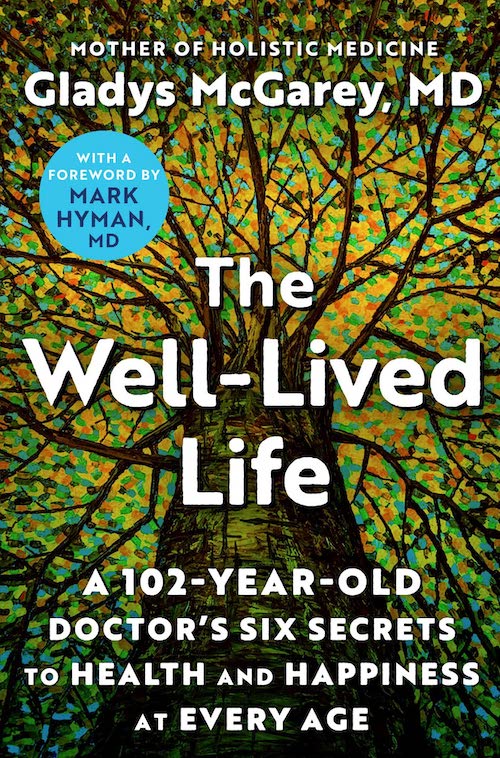 Explore the book, The Well-Lived Life here.
Petit Plaisir
—And Just Like That, season 2 Tune in to the end of today's episode to hear a detailed review of why I recommend the second season of And Just Like That on Max, addressing the critics of the show and sharing why this season dovetails wonderfully with the topic of today's episode.
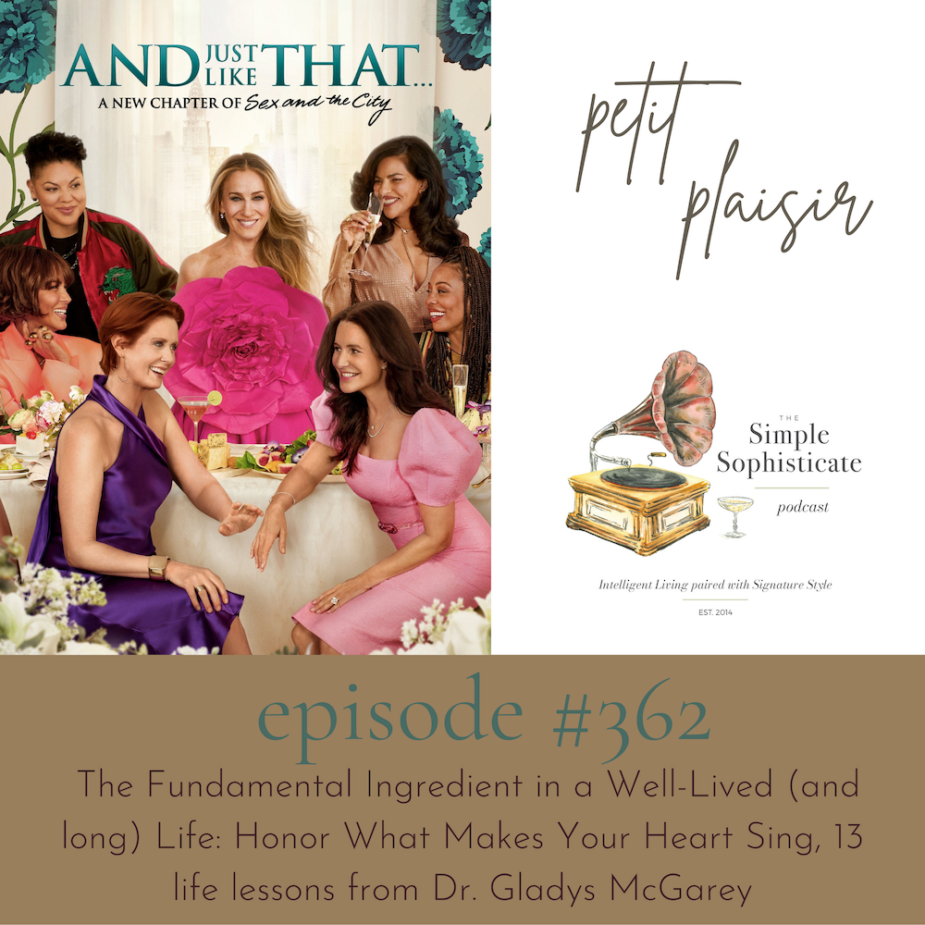
~Explore all of the episodes of The Simple Sophisticate podcast here. |
Tue, 6 June 2023
Author and philosopher of contemporary living, Alexandra Stoddard has published 28 books since she began in 1974. Continuing to be a source of wisdom, inspiration and sharing through how she lives that curiosity and forever being a student of life elevates our lives regardless of age, she joins me in a special episode to talk about her life's work. Our conversation of more than 75 minutes covers a wide breadth of content that she has written about over the years, and it's all grounded in how to live well, cultivating happiness and contentment, mindfully living in the present moment and how that daily practice changes for the better so much about all that we cannot control in daily life. From discussing the importance of rituals, to living a life grounded in paying attention to what our senses observe as well as how one can have a happy death as she speaks fondly of her late husband to whom they shared a loving marriage for over 40 years, we talk about many of the topics that are fundamental components to living a simply luxurious life, a life of true contentment. I do hope you tune in and hear the enthusiasm and genuine love of life Alexandra Stoddard embodies and no doubt will inspire in listeners to do the same in their own lives.
~Explore all episodes of The Simple Sophisticate podcast here.
|
Tue, 16 May 2023
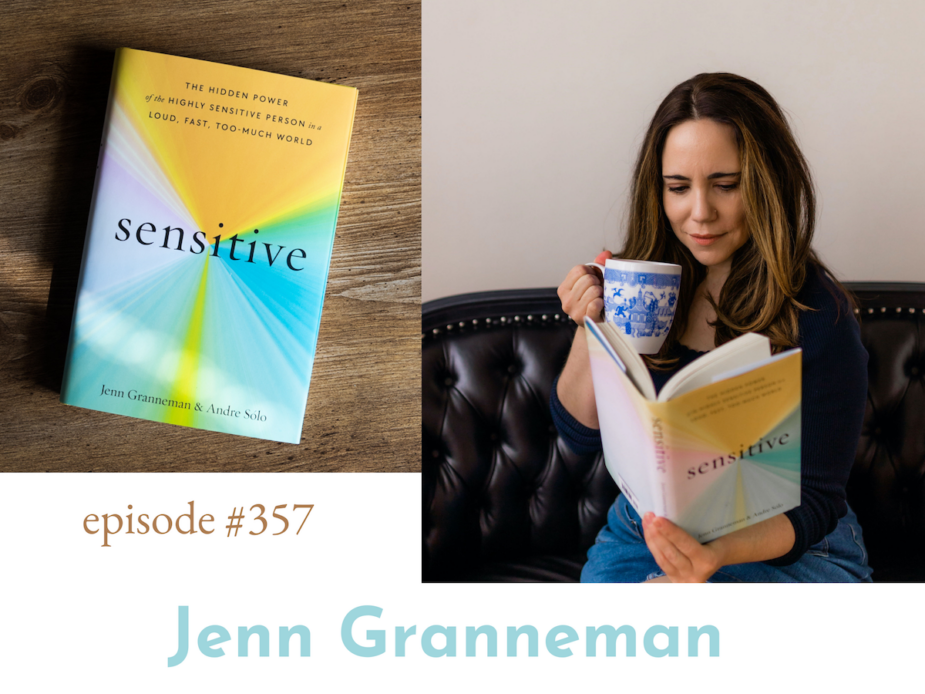 Being a Highly Sensitive Person (HSP) is a fairly new identifier to describe anyone who is highly responsive to their environment. This high responsiveness can appear in a variety of ways and different arenas of our lives - physically, emotionally, in relationships, simply going about our days and interacting with the world around us. In 1996, American clinical research psychologist Dr. Elaine Aron wrote her seminal book The Highly Sensitive Person: How to Thrive in a World That Overwhelms You, and it was in this book that term HSP was coined. Author Jenn Granneman joins me to talk about her new book on this topic of HSP, a book that includes new research that furthers supports Dr. Aron's findings, as well as exploring history revealing that this gift has always been with us, we just didn't identify it until recently, and welcoming in specific insights and tools to elevate this awesome gift that can indeed deep the quality of our entire life. Jenn Granneman's book, who she co-authored with Andre Sólo, Sensitive: The Hidden Power of the Highly Sensitive Person in a Loud, Fast, Too-Much World was released on February 28, 2023, and quickly became a bestseller in the category of Popular Psychology Studies and was recently chosen by Amazon's editor's as the Editor's Pick for Non-Fiction. Today she joins me to talk about what HSP is, the misconceptions, how being HSP is actually a source of strength, how to approach relationships and the work place as well as talking about why she hopes this book starts a Sensitive Revolution.
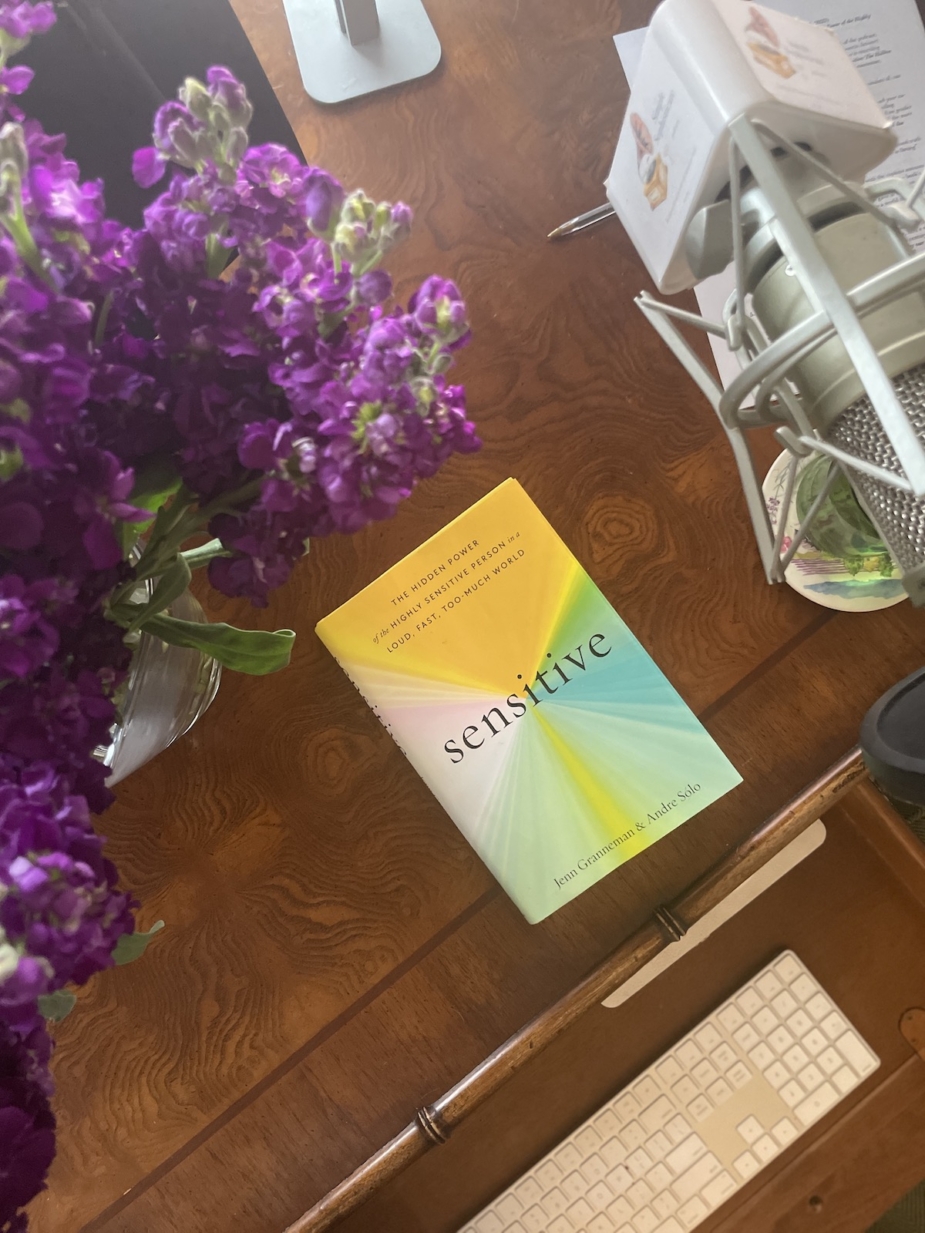 ~Explore the book: Sensitive: The Hidden Power of the Highly Sensitive Person in a Loud, Fast, Too-Much World by Jenn Granneman and Andre Sólo~ Explore Jenn Granneman's websites on HSP and Introversion below, as well as other links you might be interested in:
~Explore more episodes of The Simple Sophisticate podcast |
Tue, 28 February 2023

"It's not a matter of luck or magic. This is simply how your brain works. So take a break every now and then, and let your brain do what it does best."—Michael Hyatt & Megan Hyatt Miller, authors of Mind Your Mindset: The science that shows success starts with your thinking One of the Beatles most (of many) famous songs came to Paul McCartney simply upon waking up in the morning. As he did, at the age of 21, he was humming a tune that initially he titled "Scrambled Eggs", is better known as "Yesterday" (source). The founder of Ikea, Ingvar Kampard, came up with the concept that lays at the foundation of the now internationally recognized company - "modular furniture makes home decor more accessible", when while working at a furniture store, a customer who had purchased items for their home could not fit it into their car and had to disassemble the legs from the table in order to drive it home (source). And if you ever wanted to thank the person who made it easy and fuss-free to have your caffeine boost in the morning, thank German Melitta Bentz who, tired of "percolators prone to over-brewing coffee, espresso-type machines leaving grounds in the drink, and linen bag filters being tiresome to clean" came up with the drip coffee machine using "blotting paper from her son’s school notebook". Patented in 1908, her grandchildren continue to head the "Melitta Group KG with some 3,300 employees in 50 companies" all for a simple idea that no one had thought so simple before: patented under the title “Filter Top Device Lined with Filter Paper”(source). Aha Moments can pertain to any number of areas of our world and lives. Yes, they may prompt us to come up with a promising business idea, much like Sara Blakely and Spanx, but more often, aha moments are seemingly out-of-nowhere discoveries that pop up in our minds that give us clarity, insight and/or direction about something that speaks to our true self. Webster's dictionary underscores and elongates the enumeration of what we are gifted with in such moments: a moment of sudden realization, inspiration, insight, recognition, or comprehension. And I don't know about you, but these moments, these Aha Moments with a capital "A" and "M", are a thrill to experience. The dopamine no doubt floods our minds and the joy and lightness in our step feels spontaneous. We figured it out! What ever the "It" might be. Who wouldn't want more of these moments? And the exciting news I want to share with you today is that you can cultivate an environment - i.e. your daily life - to do just that. In a new book Mind Your Mindset, authors and husband and wife Michael Hyatt and Megan Hyatt Miller share neuro-science and psychology research that demonstrates the power of the stories we tell ourselves and accept. Mind you, not all the stories we tell ourselves are constructive, least of all always accurate, and so for a portion of the book, they examine and reveal how to change the stories in our mind to live a more fulfilling journey of discovery and success. Which brings us to Aha Moments.
In order to change the stories that are limiting us from realizing our full potential and experiencing all that life can be when we gather up our courage to engage fully and with our true selves, we have to rewire our neurons, and without getting too complicated, we have to start thinking new thoughts. The authors go on to explain that while oversimplified, the brain does have a division of left and right (even though, not physically divided as each communicates with the other, which is how Aha Moments can occur). Explained as the left side being the executive network side which guides our conscious self, "it thinks about what you tell it to"; the right side is the default network side which "loves novelty and creativity and operates largely in your subconscious". Understanding this construction and function of the brain is crucial to enabling more Aha Moments to be a part of our daily life. Why? "To find creative solutions to your problems you need to get this second part of your brain [the default network] into action. This vast network of slower-firing neurons is highly adaptable. It can be endlessly reconfigured to provide new thought and connections. Sure, this takes longer than using conscious thought [executive network], but it's highly effective." —Mind Your Mindset Which leads us to revealing the answer to the question: How to experience more Aha Moments in your life. Let's take a look at the list below. 1.Consciously choose to not be physically 'working' all the time. Often work is only deemed as work if we can see something changing physically - so physical labor, cooking, cleaning, drawing, writing, correcting papers, etc. However, even Leonardo da Vinci took regular moments, even days to not be physically working on The Last Supper, but that didn't mean he wasn't working. His mind was busily meandering, not necessarily being directed by his left brain, but giving space and time to just meander about all that he held in his subconscious, letting his right side of the brain gradually discover connections that on the surface might seem completely disparate.
2. Make time for tasks unrelated to the 'problem' and somewhat quotidian, give you full attention to what you are doing - in other words, mono-task From walking, to cooking, to eating a meal to savor, gardening, any task that requires your full attention that you can let yourself get lost in and thoroughly enjoy, but is unrelated to the dilemma or question you are trying to answer, engage in it regularly. Seemingly out of nowhere, ideas will arise, but not if we force them to, and while not every time, you are giving your subconscious space to move about because your left side of the brain is taking a break.
3. Exercise vigorously (I will let you define what vigorous is) The reason I include the adverb vigorously is because when you are fully engaged with your workout - a long run, a cycling class, a yoga class, climbing a wall, swimming at a swift pace - your mind is held in the present moment which actually lets your subconscious dance about, yep, wander and meander seemingly aimlessly, but what it (your subconscious) is actually doing is very helpful. You just need to give it space to do that work and the time to connect any dots that you, your conscious mind, cannot see or understand.
4. Take a nap I was going to include this idea in #2, but it is quite different in the sense of being conscience. Similar to a good night's sleep, taking a nap. You will wake up with sharper ideas and a clear mind. On the topic of a good, deep sleep (at least 7-hours), such a regular health habit is vital to being able to experience Aha Moments. As we know while we sleep, our brain is 'cleaned' of toxins, certain thoughts are moved to long-term memory while others are swept away or taken deeper into the subconscious as deemed unnecessary for the conscious tasks we regularly tend to. There are many people, myself included, who go to sleep at night with a question about a particular situation and wake up with ideas anew for best approaching it, OR go to sleep with a worry and wake up having completely forgotten about it because the mind, based on our past experience and habits, deems it unimportant. Phew!
5. Prioritize Play In 2017 after reading Alex Soojung-Kim Pang's book Rest: Get More Done by Doing Less I was inspired to write episode #137 of the podcast and disspell the idea that we must always be 'doing' in order to live a fulfilling and even, dare I say, productive and successful life. What Pang points out, along with so much more is that rest need not be sitting on the sofa (although it can). Rest includes giving our mind (in this case, our left-side) a break and letting ourselves play, have fun, and return to many activities that we enjoyed as a child. In Dr. Mike Rucker's recent book The Fun Habit, he concludes, "If you want a twist of fate, start twisting. Choosing fun every day in small, seemingly superficial ways can, over time, lead to new patterns of behavior—new and better choices."
An Everyday Necessity: Deliberate Rest, episode #137 
6. Enjoy a 'Lazy' Weekend or Day Regularly One of the direct points addressed in Mind Your Mindset regarding stories is what or how we should live, and all of the ideas, in any culture, are rooted in stories we accept. So often the image is presented, at least it was to my generation in our youth by our parents and grandparents that sitting in front of the 'boob-tube' was akin to being lazy. Now don't worry, I am not advocating for plopping ourselves down regularly for hours and days and weeks on end mindlessly watching whatever, but sometimes, we need time to sit down on the sofa and just rest. To physically not move and peruse magazines, books, newspapers, watch something or having something on in the background, listen to podcasts endlessly, the latter two we may not really be paying attention to, but it creates an environment urging us to just be still. And when we are still, when we rest, when we are idle physically with no directive for our mind to attend to or a task to complete, the right side of the brain becomes quite happy and starts to make connections or attempts to make connections to see what might be possible. The authors in Mind Your Mindset suggest if you are trying to figure something out, you can point your mind in the direction you wish it to figure out, but then you let go. Let go and go about relaxing and toodling about with no objective in mind and what you are enabling is something quite constructive. So long as you do this regularly, your mind will begin to offer you ideas that seem initially as if they came out of nowhere, but you and I know differently. :)
Last but not least! 7. Feed your mind with a diverse serving of ideas and experiences The only way, unique and awesome Aha Moments can come to the forefront of your conscious mind is if you continue to remain curious about life. Since you were a child, you have been exposed to a vast breadth of ideas, objects, experiences, people and information. As an adult you have agency to choose to continue to explore new ideas, to deepen your learning, to see new places, experience new cultures, food and anything that is not part of what you already know (or think you know). By choosing to feed your mind with constructive nourishment, even if you don't know what you will do with the 'food' you receive, your subconscious holds on to these moments, and that is what it is dancing about with as you engage with each of the previous six ideas shared above. Which also means, mind what you feed your mind. Be conscientious about what you are exposed to, the information that swirls about, the words that are used, the attitudes, energy, etc. All of this will determine the quality of your life, and when you then make space to exercise your right-side of the brain, beautiful and what may have once seemed impossible discoveries will be made, and your life will change.
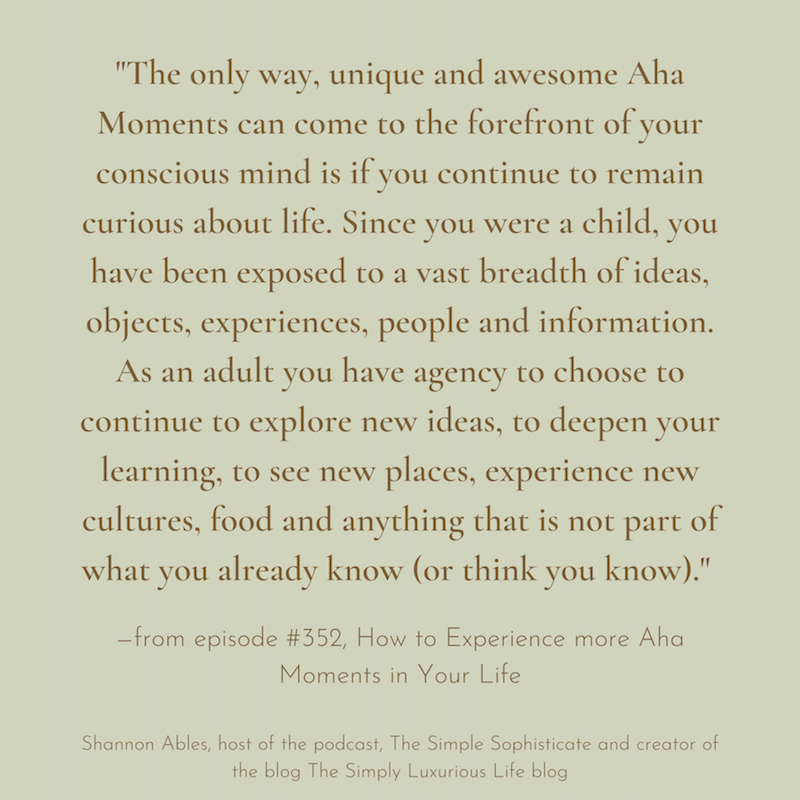 Wishing you many Aha Moments in your near and distant future.
Petit Plaisir
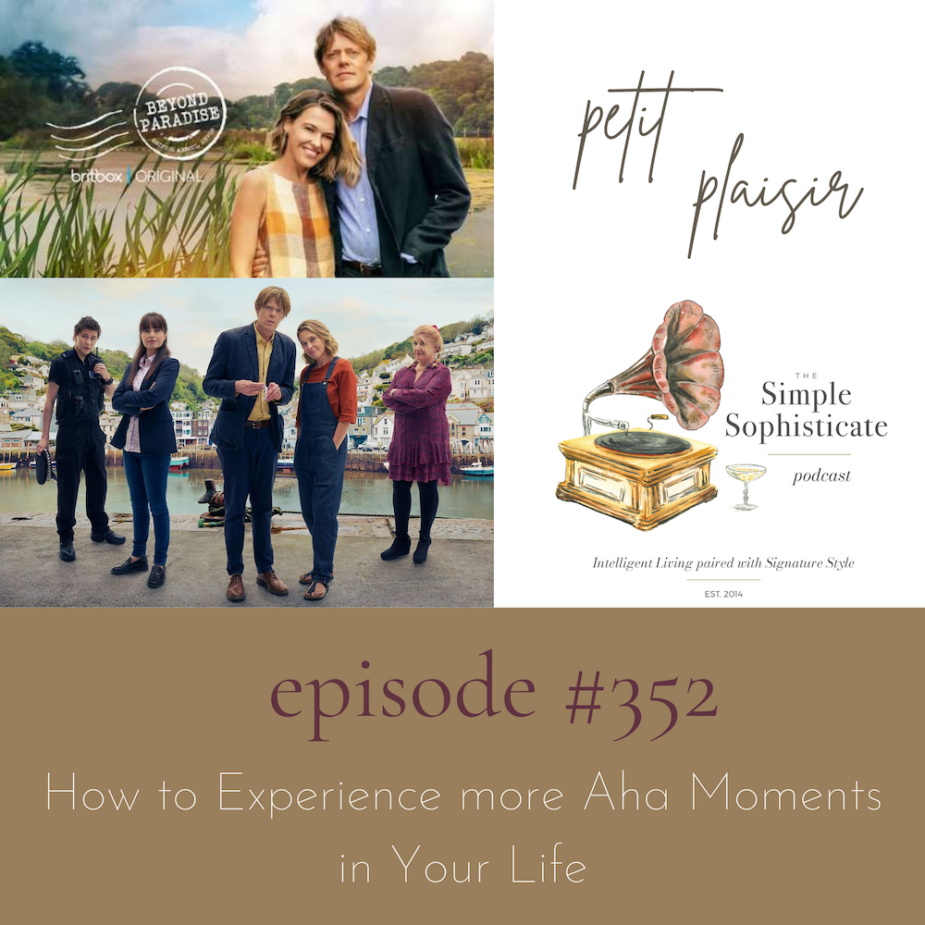
|
Tue, 3 January 2023
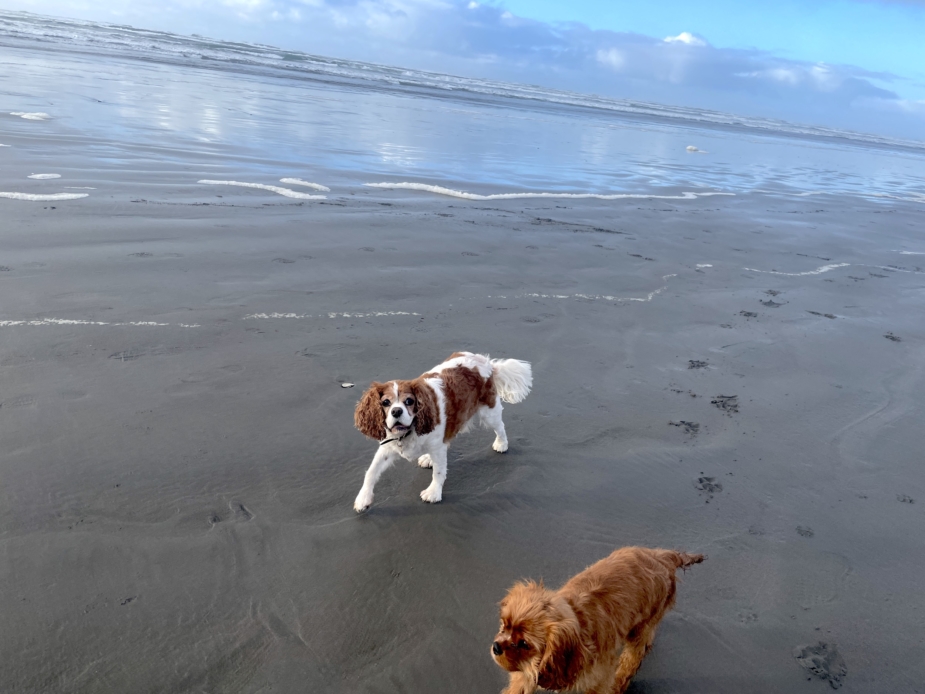
"The greatest gift that manifesting can offer us is not to help us attract things for us to possess but to help us unleash the most empowered, authentic, self-loving, and truly magnificent version of ourselves that there is." —Roxie Nafousi How we live, how we think, what we think determines the destiny of our lives, and all three are thankfully within our control. All three actions - living, thinking, selecting [which thoughts to think] - involve just that, being active rather than being passive. However, the paradox arises when we choose to first actively and consciously engage constructively with each daily practice - thinking, living, selecting - but then, . . . let go and let the magic unfold as it will. When I first picked up Roxi Nafousi's new book Manifest I wasn't sure how she would present the idea of manifesting, but I quickly discovered that she spoke to the core tenets of living simply luxuriously which involve active participation in our lives, deepening our awareness and knowledge of how our mind works and applying that knowledge to tap in to discovering what lies within that is uniquely who we are. In fact, late last year, I wrote a post about self-sabotage and better understanding the temporary discomfort that often derails the life trajectory that will ultimately bring us deep fulfillment, a discovery of insight taught in Nafousi's book. And there is so much more within the pages of the book to inspire you as you step into this new year, so I wanted to give one more taste of what manifesting entails because what it gave me was a sense of peace to let go once I have clarity and am willing to act consciously. To begin with, Nafousi's book is neatly organized around the seven steps, and each play a necessary role in cultivating healthy habits and thought defaults that set you on the right track to create the magic that at this moment may seem impossible. To reiterate, manifesting is not a passive approach to life. "You cannot just be clear in your vision and then wait for it to appear." So what does that mean exactly? Step two in the book centers around eradicating fear and doubt from your life, and she goes into great helpful detail to explain how by allowing fear and doubt into your life, errantly believing that they are your 'friends' is a significant reason you are not manifesting the life you wish to live. As it pertains to being active, Nafousi teaches that we must align our behavior with what we imagine to be our future life and selves as this reveals that we value ourselves, and we have a healthy awareness of our self-worth. If we allow fear and doubt to limit our vision of our life, then, as she describes, 'the universe won't believe you believe what you say you deserve." And this is where the hard work comes in. So you want to pass the bar exam? You cannot just 'think' your way to passing the exam. You are going have to study, prepare, study even more, and re-prioritize your time for a duration in order to ensure you are prepared to pass. Want to learn a new language? You are going to have to invest in quality instruction, invest your time, continuing to study regularly and surround yourself with the language as much as possible for a decently long duration of time, but your clarity of what your vision is gives you the road map and helps you to stay focused. Nafousi points out that once you know that path and what it might take to manifest what you envision, fear and doubt may still crop up. How? By way of excuses - "I don't have enough time", "I don't have enough resources [i.e. money, support, etc.]", "I don't have enough energy". Each of these excuses are just that, excuses borne out of fear or doubt. The excuse is a subterfuge for saying "I am not worth what I seek and I don't believe I am actually ready for what I hope for". But here is the good news: If you have done the homework of you, examined the feelings behind what you seek, and know in your core that what you are trying to manifest is sincerely aligned with your true self and fulfillment, toss aside the excuses. Yep, even if you cannot see how the money situation will work to make it a reality. Why? The universe has a magical way of making it work out. Maybe not exactly as you envisioned or when you envisioned it would all come together, but if you are willing to risk and toil and invest your time and whole heart, your sincerity is in many ways a silent language that the universe understands. Stay the course, keep investing (non-monetarily and monetarily), and then let go as you travel forward on your journey. That is the paradoxical part of this beautiful concept of manifesting. Let go.
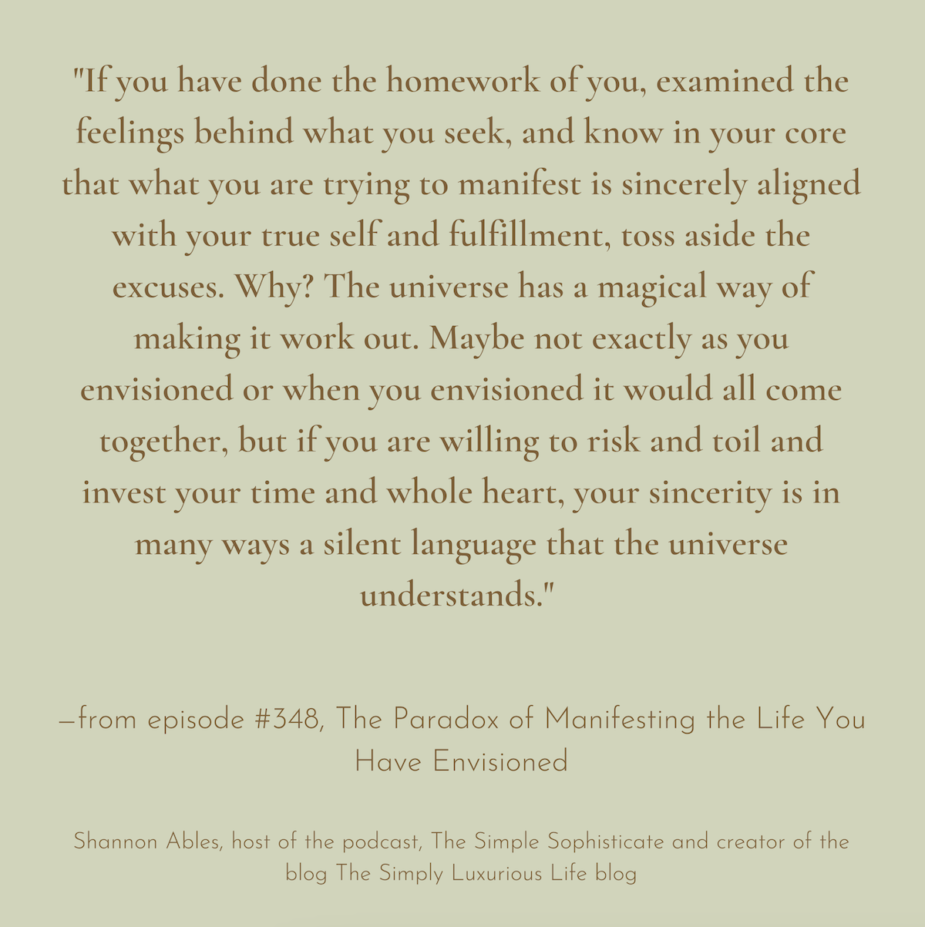 You still remain active, you are still wholly engaged, but what you will find is because you are truly aligned and sincere, the weeks and months, maybe even years on the calendar may flip by, but you are building capital as they say, building further proof that you believe you are worthy of what you are investing in and at some point it seems to all come together, often more beautifully that you could have imagined. But the good news is that you enjoyed the journey to this point as well because that journey was and is your life, just as much as arriving at the moment of manifestation. "True contentment and joy come not from material possession but from the relationships around us; from our sense of purpose; from our ability to live in a way that reflects our most authentic self. So, when you are deciding what you want to manifest, choose the things that will bring you the most fulfillment possible and know that the only person who can decide what that is, is you." —Roxie Nafousi The letting go also comes in the form of "letting go of who we think we should be, who other people expect us to be, and who we once were." During this time of limbo, when you have let go and are swinging forward to a less 'known', but no less specifically desired outcome, there will be tests. These tests are something we have talked about frequently on the blog. These tests crossing your path, believe it or not, come as a good sign because it means you are beginning to grow and change, and the universe just wants to check to see if you indeed believe in yourself. Each test also brings a gift, and that gift is a lesson you need to learn in order to step closer to the outcome you seek. Take the test, pass the test, move forward. You've got this. And the only way to fail the test is to not look for the lesson it wishes to teach you. Simply face the test, engage, explore, try your best, and as Nafousi points out "whenever you make the energetic shift to overcome your test, you will be rewarded with abundance." If that all seems a bit 'whoo-hooey', let me put it in more concise terms: it comes down to your mindset - are you set in a scarcity mindset or an abundance mindset? In a detailed post written this past November, I share how to shift your mindset from scarcity to abundance because in order to live the life you have envisioned, your mind must rest in abundance. And part of making that shift is stepping past the fear and the doubt that wants to keep you right where you are, and the only way to move forward is to engage with each test the universe sends your way and not cower. You may shake a bit, but remain standing and explore what is being presented. You don't have to act right away, but take your time, ask questions, feel your way around what is really going on and what you are really feeling and why. The balancing of taking action and letting go may initially seem a tricky, and almost impossible balance, but really what life is asking of you is to be present. There is no need to rush so long as you have put forward your intention with the clarity that you now have. Sometimes you will have to wait months and years for the materialization, but in a flash, all of a sudden it arrives. Almost so quickly it doesn't seem real and you question it, but rest your mind in the place of reassurance that this is indeed real because you put your intention and your energy out there a long time ago, and finally, the opportunity arose because you let go and moved with the timing of the universe. Seize it and savor it.
Manifest: 7 Steps to living Your Best Life by Roxy Nafousi 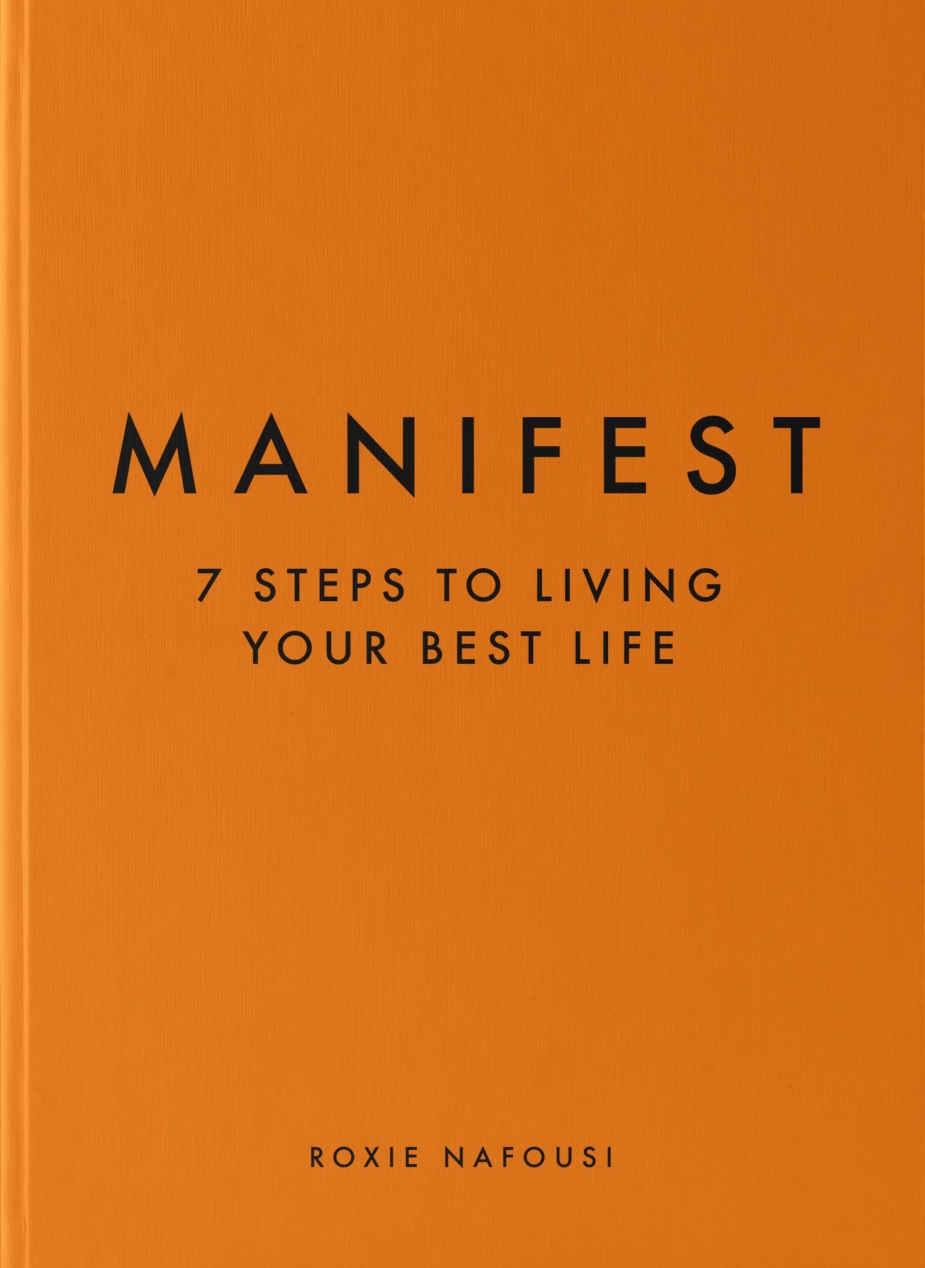
Petit Plaisir This Beautiful Fantastic, film (2017)
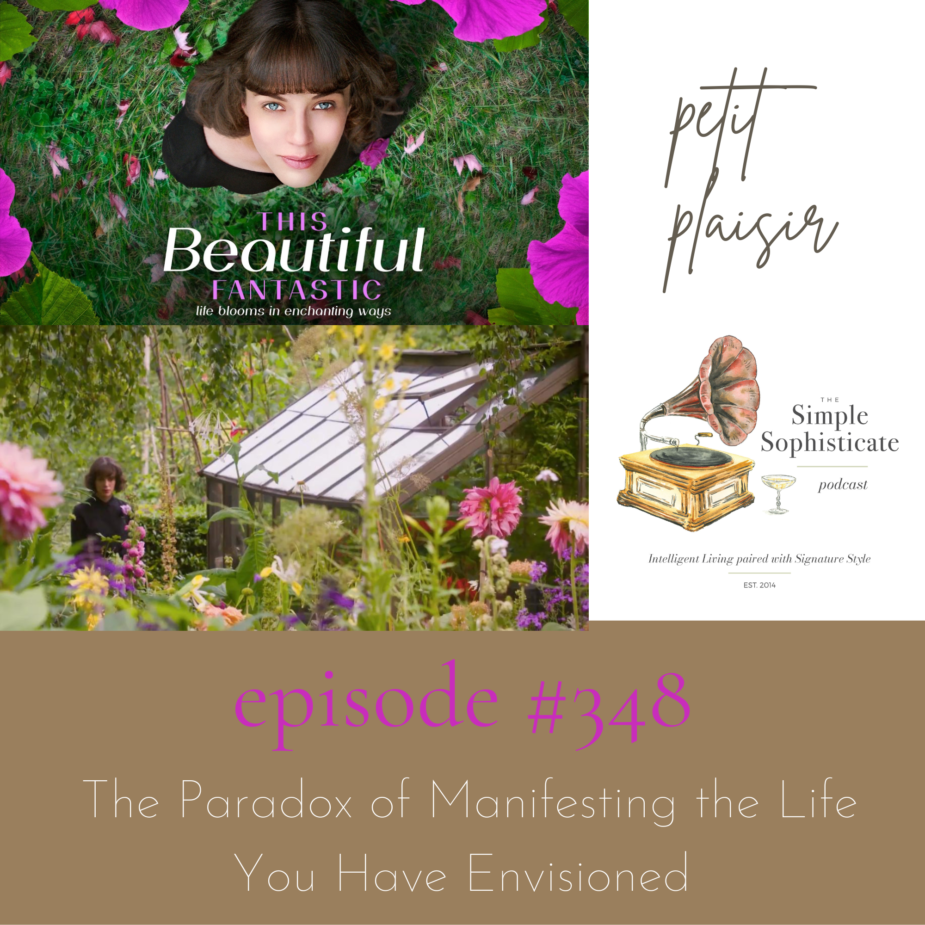 |
Sun, 19 June 2022
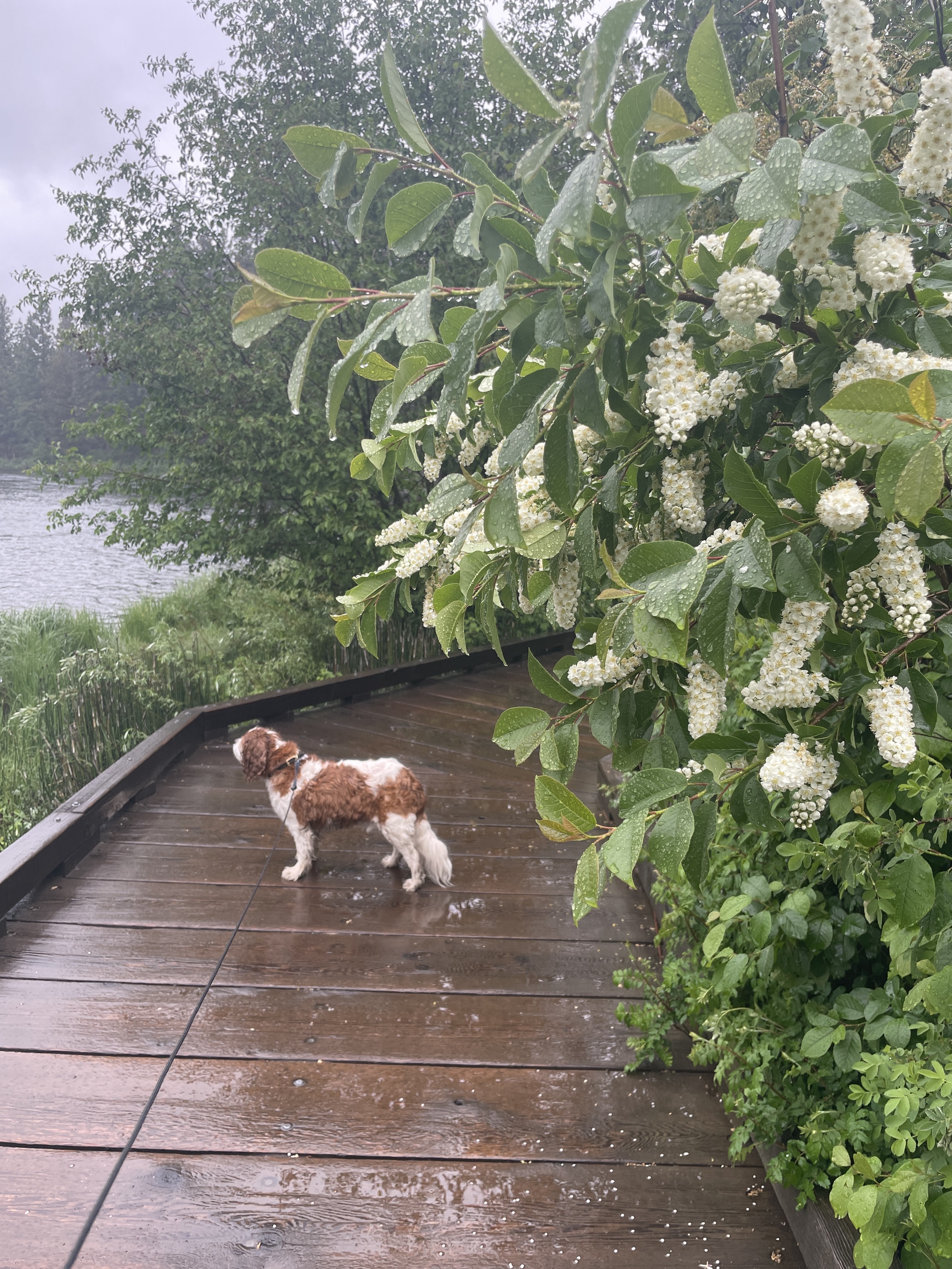
"Your soul needs time for solitude and self-reflection. In order to love, lead, heal, and create, you must nourish yourself first." —Louise Hay Stillness. Silence. Solitude. Whether you have ten minutes or an entire afternoon or day to give to quiet contemplation, otherwise known as reflection, when you choose to do so, you ground yourself, ensuring the next "step" in your life journey will be far more constructive and in alignment with a life of contentment. I happened upon an observation made by Paul Child, the husband of Julia Child, while reading Warming Up Julia Child: The remarkable figures who shaped a legend, while traveling the west coast during the first book tour for his wife, sharing in a letter with Avis DeVoto about the bustle in Southern California whose population was skyrocketing at the time,"'So busy w/material consumption & social whirling,' that they neglected reading and reflection." It was his concluding clause of what he felt was lacking that immediately drew my attention: His prioritizing and valuing of reflection as a regular pastime for a deeper appreciation of art and science, and well, living well, in his opinion. Unconsciously, it has been my nature since I was a young girl, to reflect often. Likely associated with being introverted, but because it was unconscious, overthinking could occur which was unproductive. However, because I knew and had many examples from my life journey that resulted from being reflective, thinking deeply about a project, life choice, or temporary dilemma, I knew there was great power in being reflective. The skill I needed to learn was how to harness it for constructive purposes and to recognize when it became destructive (when my mind would regress to its Lizard Mind tendency and spend time in the land of worrying and catatrophizing).
“Most true happiness comes from one's inner life, from the disposition of the mind and soul. Admittedly, a good inner life is difficult to achieve, especially in these trying times. It takes reflection and contemplation and self-discipline.” – William L. Shirer William Shirer, an American journalist and war correspondent, and notably, the first reporter hired by Edward R. Murrow, acknowledges the need to attain the skill of self-discipline, and the understanding that a strong and healthy inner life is a conscious effort that is not easy, but powerfully rewarding when achieved. In 2010, I shared a list of benefits when we acquire the skill of self-discipline, and over the years I have found to be true that it is when I have clarity about my priorities, about myself and how best to nurture myself so that I am deeply content and at peace that self-discipline becomes easier and isn't a battle with bad habits I wish to eliminate. It may at first seem antithetical to slow down and be still to gain a better life, but as was discussed in last Monday's Motivational post, it is through subtraction that we increase the quality of our life. Silence and the act of Reflecting go hand in hand, as we need to provide the space to recall, remember, examine and consider. As artist from the 16th and 17th century Francis Bacon states, “Silence is the sleep that nourishes wisdom.” In order to understand, we must slow down. In order to find peace with our direction, we must find the time to be still and ponder all that we have experienced during the day, the week, etc.. Confucius as well prioritized the importance and value of reflection when he said, "By three methods we may learn wisdom. First, by reflection, which is noblest. Second, by imitation, which is easiest and third by experience which is bitterest." To reflect enables us to avoid unwanted outcomes, events, loss, pain and hardship. Similar to a pickup that has found its way into a sinking water-logged mud puddle. To continue to spin one's wheels literally, only digs the pickup further into the ground, making it more and more difficult to be pulled free. It is through pausing, reflecting on the situation, ascertaining a plan that is not identical to the one that brought you to the mud puddle that will enable a desired outcome.
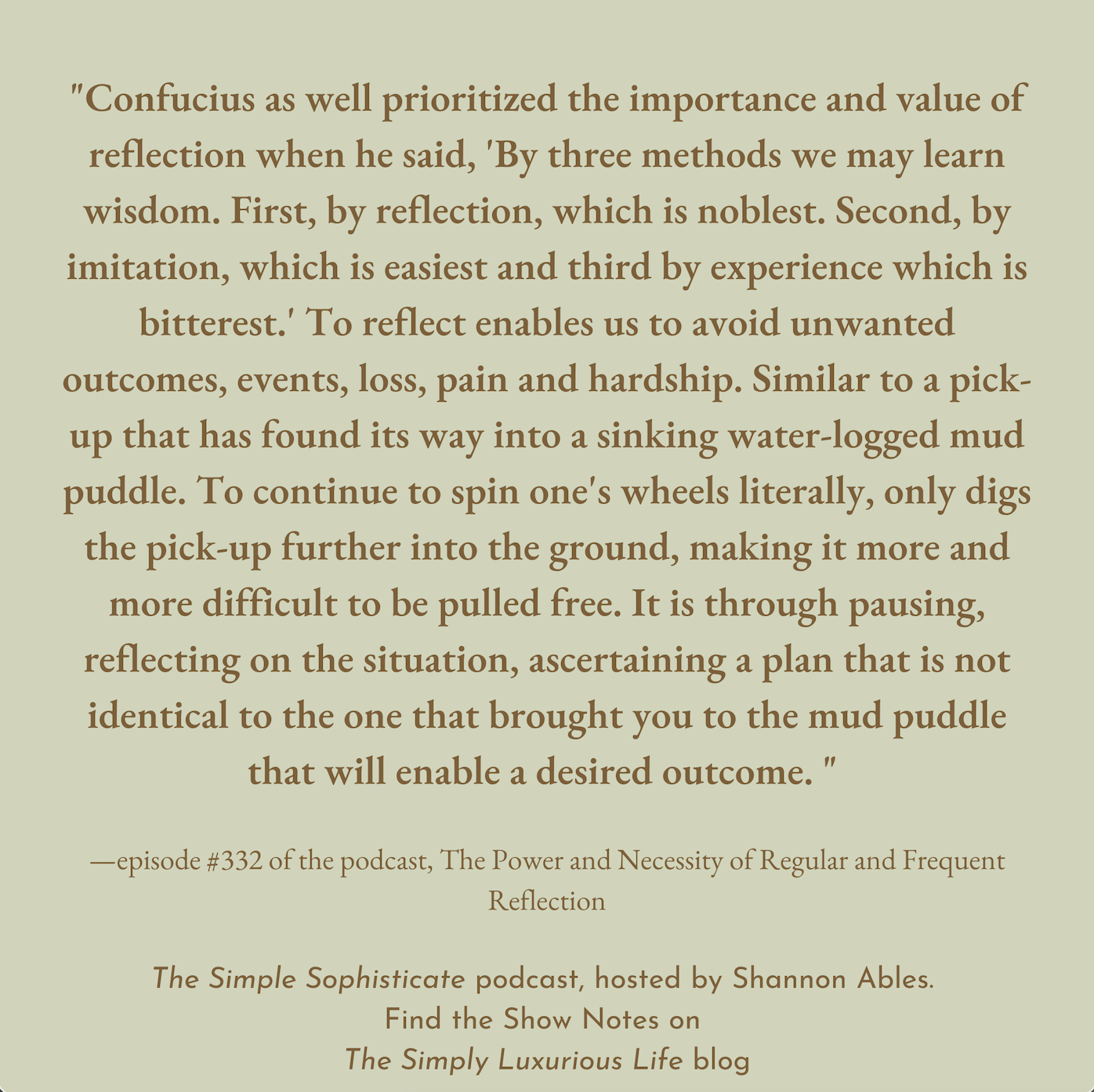 As my own daily life has become far more quiet, I have found myself experiencing moments that remind me of my childhood when I would while away entire afternoons or mornings, completely enthralled with an excursion with my horse or other animals, writing or reading, or simply toodling about letting my curiosity lead the way. Absolute bliss. And such moments were made possible because I gave myself time the year and two years prior to reflect on what was and what was not working in my life, what made me feel fulfilled, grounded and at peace, no matter what others said I should be doing to attain such desired outcomes. In this turning point in my life, reflecting was a vital tool that gifted me with the trust in my decision I had for so long been too scared to make. As I know there are many fellow introverts as well as HSPs in TSLL community, reflecting, as I mentioned above, is likely already part of your everydays. The struggle I consciously have identified to be a barrier I need to work through (or around) in order to get on the other side of is acknowledging and finding peace with the truth that I thrive in an environment and approach to living my everydays that many people I had surrounded myself with or been surrounded by (due to teaching) don't find to be comforting or nourishing. For so long I expended energy, with my family, with colleagues or friends trying to explain, defend and becoming frustrated sometimes to the point of exasperation as though I was banging my head against a wall, that how I enjoy living my days is the real deal. It genuinely brings me deep satisfaction, elation and it is my place of true contentment. Some of these people I would try to convince extended pity, some assumed their way of living was superior because it wasn't their way and so I must be unhappy even though I claimed otherwise. And so what I am in the process of doing is finding peace with the reality that they may never understand, finding courage to speak my truth in a loving yet strong way, being at peace with the reality that my truth may cause some of these people to feel discomfort in the moment when I share, but I avoid feeling resentful later which is a destructive and unhelpful feeling as I move forward building and nurturing relationships with people who accept a truth they may never understand, and lovingly acknowledge there are many ways to find contentment and thus many moments of happiness.
I share the above journey first because all of my ahas discovered came about through regular reflection. The ahas didn't come instantly, but they did come. Often assisted by reading, as Paul Child paired with regular reflection, because none of us has all the answers to the questions we will come across while we reflect, and so in areas where I didn't understand, I looked to those who knew far more than I did. And the second reason I shared the above journey is because I wish I had heard someone say this to me, to tell me how you live your life, what brings you peace, calm, exuberance need not be validated by others. In the introduction of the November chapter (chapter 11) in The Road to Le Papillon: Daily Meditations on True Contentment I speak about an aha I had about savoring my joy and not asking permission or validation from others to acknowledge that my joy was okay. Once I became conscious that I was actually unconsciously seeking others approval to feel joy, I then gave myself the approval from within and stopped seeking it outside of myself regarding how I enjoy and find peace in my everydays. So if I can give any amount of peace of mind to encourage you to continue to enjoy your days as you do regardless of whether others in your life currently understand, I hope I can do that today and here on TSLL blog. 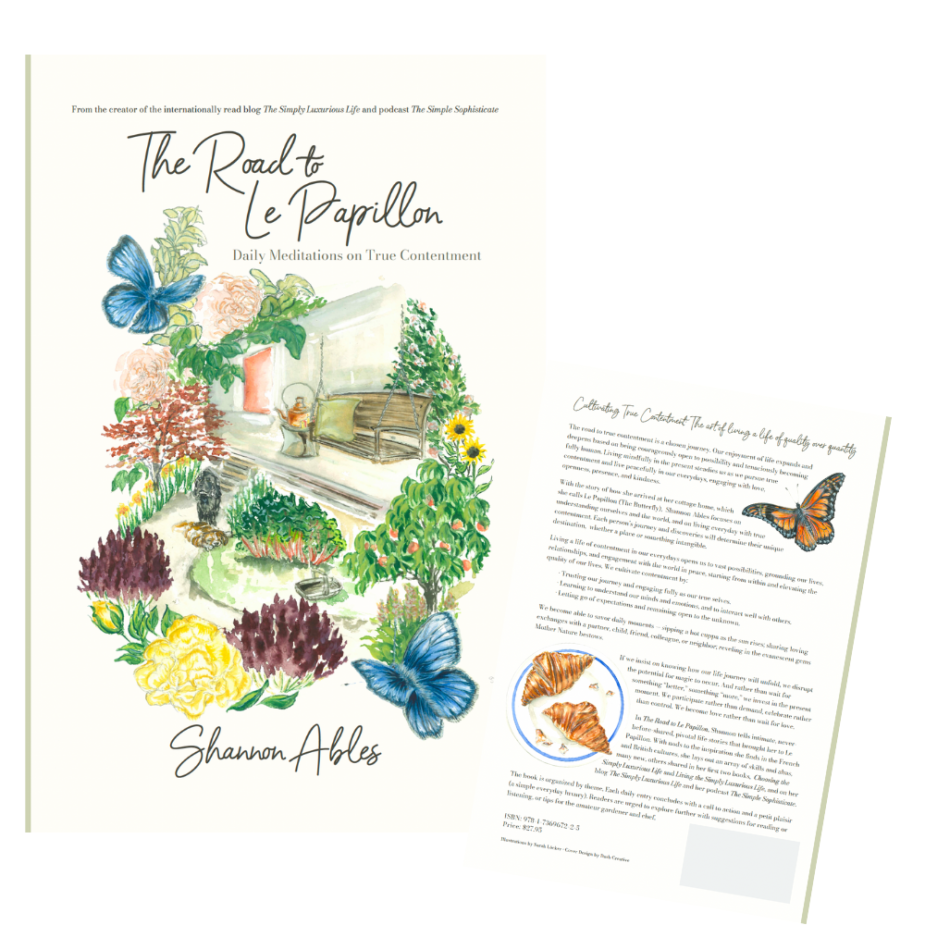
What exactly does 'reflecting' look like in our daily lives? Well, let's first take a look at what it is not. It is not meditating. Meditating is a valuable skill and practice, something I wrote a detailed post about sharing six benefits and how to meditate daily, but reflecting requires you to use the mind, to contemplate, to examine, and meditation asks you to observe your mind, to step back and strengthen your ability or simple awareness so that you engage with each day with more mindfulness, being able to hold yourself fully in the present moment. (1) Reflecting asks for you to find a quiet space. This could be in one spot or on your walk while you either listen to your favorite music, anything that doesn't ask you to think about the content you are hearing, so in order to reflect, you will want to turn off the podcast episode (counter-intuitive direction coming from a podcaster, I know :)). Maybe it is while you are taking a bath, taking a shower, sitting in your favorite cozy chair or outside on your porch or working in your garden. You can be doing something while you are reflecting, but it needs to be quiet which enables your thoughts to wander without influence or distraction. (2) Journaling often helps us to understand what our thoughts are trying to help us understand. As I shared a couple of weeks ago, often it is when I put what I am thinking about on paper that I make more sense of what I am actually trying to work through. The process of manually telling my hand to write a certain word or idea helps me solidify what I am actually feeling, wanting, or what is causing frustration. (3) Reading can help prompt reflection, but only if you stop to let yourself ponder and mull over what it is that was sparked in your mind while you were reading. When I was teaching, I prompted my students to annotate while they read because it helped them to actively engage with the writer. And while it did slow their reading down, it also strengthen a closer reading of the text. My description of such reading and writing on the page was that they were having a conversation with the author - questioning, sharing ahas, challenging, understanding, etc.. (4) Regularly engage in reflecting and thus it will become a practice that not only becomes easier to do as you will find great benefit as you go through your days, but you will want to return to this comforting space in your day. Reflecting becomes a space where you are conversing about the day's and life's events, making sense of them as best you can and if you cannot, presenting questions for your mind to mull over in the days and weeks to come. I find the latter to be unexpectedly powerful because our mind is there to help us if we let it. We can sometimes pose a question to our mind, sleep on it, and wake up with an amazing aha we had not thought of but because so much stored information is in our long-term memory, it took our mind time to find where it was located. :) (5) Practice meditation. I know, I know, I just said that meditation is not reflecting, and I am sticking to what I said, but in order to have an effective and beneficial reflective practice, you must have control of your mind. You need to be able to tell it where to go and where not to go, and how you do that is by strengthening the muscle that is the mind, and you do that through meditation.
The Benefits of Regular, Frequent Reflection Now that my days have breath, in other words, regular 'white space', something Mozart reminds is how the music is heard and thus appreciated (here is his actual quote, “The music is not in the notes, but in the silence between.”), I reflect every day and have found great strength received, grounding steadiness and a more sturdy confidence in my journey moving forward which is full of so many unknowns. Often the reflecting is in my journal, but it can also occur while I am taking my long morning walk with Norman or our short stroll in the evening. I have had to consciously remain vigilant that my mind doesn't let the reflecting wander where it doesn't need to go - worry, catatrophizing, etc. - places it would go without my knowledge previously of how to stop it or acknowledging that doing so was unnecessary and definitely not helpful, but such bad habits have been significantly reduced if not eliminated. I find this bad habit arises when I am tired, have not given myself enough time to recharge, and so I am being more mindful of my daily schedule as well. The key to ensuring your reflection is beneficial is to always be focusing on constructive actions and progress rather than ruminating on negative events. The latter is where 'overthinking' and catatrophizing can happen, and there is never a benefit in such mental habits. This is where strengthening your mind gives you the power to direct your mind's attention. This is where meditation is a skill that contributes to reflection as meditation strengthens the muscle that is the mind. Now let's look at the benefits of regular, frequent reflection.
"Honest self-reflection opens your mind to reprogramming, change, success, and freedom."- Vikas Runwal As well, in order for any of the below benefits to be experienced, you must be brave enough to be honest with yourself. You may not like what your mind discovers upon reflection during certain instances as you realize you behaved or acted or spoke in a way that was not in alignment with who you want to be. You may discover you need to apologize and accept the consequences of your choices, but in so doing, you will learn, and because you are reflecting you are beginning to create positive change.
"Time and reflection change the sight little by little 'til we come to understand." —Paul Cezanne 1.Deeper clarity of direction 2. Decision-making becomes easier 3. Deeper clarity of your needs, dreams and their roots of origin - are they yours innately or placed upon you by society 4. Better selections of which relationships to become a part of, to invest in 5. Improved relationships - you discover areas you would like to improve, better understand about yourself, and you also find your voice to communicate your needs, desires and interests. 6. Reduction of stress and anxiety as you become comfortable with your own company, strengthening your sense of agency as you trust your decisions and competence to navigate whatever the future presents. 7. Deeper and more restful sleep 8. Improved Emotional Intelligence (EQ) In order to welcome a regular and frequent practice of reflection, you may have to rearrange your daily routine, but I assure you, the benefits, what you gain, will be more than worth it as you will begin to live a life you deeply love. Changes will certainly be a part of your journey when you begin to reflect in this way, but the changes will be made by you, and will be constructive. So today, embrace your own company, befriend yourself, as Jane Austen describes the leading character in Mansfield Park Fanny Price, "Her own thoughts and reflections were habitually her best companions." Once you begin to confront behaviors and choices that do not contribute to the life you want to live, you will greatly enjoy the company that is your constant companion, you.
"The capacity to reflect is at the heart of what it is to be an effective learner."- Bill Lucas
SIMILAR POSTS/EPISODES YOU MIGHT ENJOY
Petit Plaisir
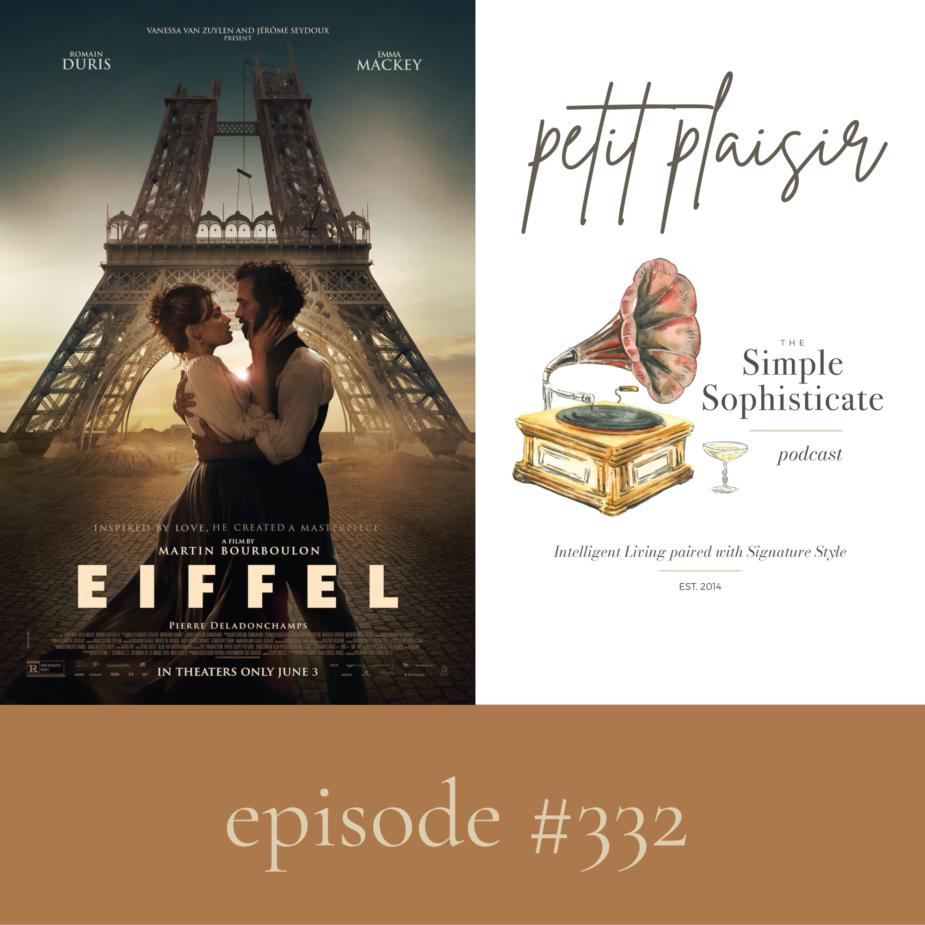 ~The Simple Sophisticate, episode #332~Subscribe to The Simple Sophisticate: iTunes | Stitcher | iHeartRadio | YouTube | Spotify | Amazon Music |
Sun, 27 January 2019
 "Resilence is more than bouncing back from adversity. People who are resilient keep pursuing their goals in the face of challenges. Consequently, learning how to regulate your brain's motivational machinery is a key aspect of resilence." —Rick Hanson, Ph. D, author of Resilient: How to Grown an Unshakable Core of Calm, Strength and Happiness Living well and successfully reaching our fullest potential in part resides in understanding what is and is not in our control. Once we understand what we have control over, for example, and for today's post/episode's purposes, the mind, then we need to be willing to take the time to learn how it functions and how we can use its talents to enhance the overall quality of our lives. Dr. Rick Hanson shares in the introduction of his book Resilience that "the brain is continually remodeling itself as you learn from your experiences. When you repeatedly stimulate a 'circuit' in your brain, you strengthen it." After reading his book, which is organized by the needs we have as human beings - safety, satisfaction and connection - readers discover the skills, and then the tools to build those skills to build our resilience. "True resilience fosters well-being, an underlying sense of happiness, love and peace." And in order to foster the sense of each of them and hardwire them into our being, we need to experience them, seek them out and consciously savor them so as to remember how to live each day consciously as we build a life we love living each day. Hanson asserts and I have to certainly agree, when we practice and improve our resilience in good times or seemingly benign moments in our everyday lives, we "will feel less anxiety and irritation, less disappointment and frustration and less loneliness, hurt and resentment. And when the waves of life come at you, you'll meet them with more peace, contentment and love in the core of your being." So let's start by looking at our everyday lives and discovering how we can strengthen the muscle, the skill, that is resilience. 1.Take care of your own well-being first "Being good to yourself is good for others. When people increase their own well-being, they usually become more patient, cooperative, and caring in their relationships." We can only give our best selves when we care for ourselves well. When our needs are met, we can help others who are in need of generosity, understanding and patience. Read/Listen to episode #242 for 31 Ways to Practice True Self-Care. 2. Notice and savor enjoyable moments Creating the habit of being self-compassionate is a learned skill. And with any skill, it takes conscious effort and repetition to habituate the skill into our default systems. Hanson advises, "Once you're having [an enjoyable] experience, feel it as fully as possible and take a little time —a breath or two or ten — to stay with it. The more often you do this, the more you will tend to hardwire psychological resources for yourself." Once you have strengthened this skill, you will be better able to utilize it during difficult as well as joyous times. ~Learn more about self-compassion and how to cultivate it in episode #122 3. Welcome Enjoyable Moments into Each Day Conscious living is thoughtful living to pay close attention to how our days are constructed. Now this doesn't mean we have to plan every minute of the day and it doesn't mean everything must be nose-to-the-grindstone work or striving for nothing but perfection. What Hanson encourages is to understand and find what is enjoyable about the tasks you both want to do and have to do. Completing a project at work for example, while the entire task may not be enjoyable, ask yourself, what is and focus on that. In so doing, you are more engaged, more attentive and more likely to give your best and have a more positive outcome. On the flipside, for those activities you enjoy, make sure you partake in them regularly and savor the enjoyment you derive from doing so. Each time you focus on the reward, the enjoyable part, the brain releases dopamine, norepinephrine and natural opioids which then prioritizes in your mind what actions it wants to continue to pursue unconsciously. So essentially, you are beginning to hardwire your brain for wanting to do things that you consciously know will add quality to your life whether the enjoyment comes from have-to tasks or want-to tasks. 4. Repeat the superpowers you want to be part of your brain's hardwiring "The more [neurons] fire together, the more they wire together. In essence, you develop psychological resources by having sustained and repeated experiences of them that are turned into durable changes in your brain." Hanson shares that our character strengths, mood, skillful ways, outlook, good habits, etc. are predominantly learned as only one-third are innate in our DNA. The remaining two-thirds are acquired through learning. This is good news, but it also means we have a massive responsibility in recognizing that we are who we either consciously or unconsciously choose to become. As Hanson coins, "who we learn to be". 5. Encourage Beneficial Experiences "See the jewels around you." The brain's negativity bias is programmed to protect us, and so it will bring to the forefront, if we aren't the master of our mind, all the negative in our days. However, when we understand why the brain is doing this, we can counteract it by seeking out, observing, savoring and incorporate more positive little moments into our day. From savoring your breakfast or that cold glass of water, observing the beauty of the day, or the happy step of your pup as you head out for your walk, when we pay attention to the good experiences, we are nurturing our well-being. Why? Because if we are regularly letting the negative take the stage of our attention, there is "wear and tear on your body and mind". 6. Understand the essence of learning What we learn, we become, and since two-thirds of who we become is learned, knowing how to learn is essential, so we can do it well and learn what will improve the quality of our everyday and overall lives. Hanson's acrynom for learning is HEAL (H - Have a beneficial experience; E - Enrich it, A - Absorb it; and finally, L — Link it to replace or soothe painful material). The first three steps are the essence of learning. With that said, we need to live consciously. We need to choose experiences that are beneficial or have the potential to be beneficial. To enrich each of these beneficial experiences, we need to be fully present, taking everything in, slowing down, looking for something we had not seen if we are experiencing something beyond the first time, and then become clear as to why the experience is valuable to you. (a more detailed list regarding how to enrich experiences is hared on page 58 of Hanson's book). Once we have enriched it, we need to savor the experience, or absorb it. To be clear, and Hanson points this out and I think this is vitally important to not misunderstand: Absorbing doesn't mean hanging on, clinging and not letting go. In fact, you are letting it go because you were never holding on to it, just noticing it, being present with the experience and appreciating it. Absorbing has to do with letting yourself feel good, letting yourself bask in the warmth of what has been part of your experience and in your own way, letting it become a part of you. Experiences can stay with us forever. Make sure the experiences that stick are wants that truly jewels. 7. "Let the Flowers Pull the Weeds" I love this analogy, and the neurology behind the concept demonstrates how we can rewire our mind to reframe or eliminate negative thoughts and unhelpful attitudes about life and replace them with beneficial ones. Hanson points out that practicing mindfulness will be a helpful tool to be able to grow flowers whilst bringing as well to your attention the weed you want to replace. Because when you are able to hold two thoughts simultaneously, it is then that the good can begin to replace the negative, as you are able to recognize that good that is true and begin to chip away at was no longer serving you. 8. Be Mindful of The Self-Critic and Strengthen the Inner Nurturer "There are two different attitudes or 'voices' inside us all, one that is nurturing and another that is critical, one that lifts up and one that weighs down. This is perfectly normal. The inner nurturer brings self-compassion and encouragement. The inner critic helps you recognize where you've gone wrong and what you need to do to set things right . . . for most people, the inner critic goes way overboard . . . it's big and powerful, while the inner nurturer is small and ineffective, which wears down mood, self-worth and resilience." The inner critic needs to be kept in check, and this can be hard to do when moments in life, people in our lives become frustrating or hard to work with. We can be excessively harsh on ourselves which is why in such moments, we especially need to have a strong inner nurturer. A simple truth to keep in mind is that overtime those of us who allow our inner critic to run rampant are actually less productive in what we are critical about, and ultimately, that bleeds into our overall quality of life the elevation of living well we are able to reach. 9. Practice "liking" more and "wanting" less "The root of [wanting] means 'lack'. It's natural to like things that are pleasurable, such as a sweet dessert with friends. But issues arise as we move from liking to wanting, from enjoying a meal together to insisting on the last piece of pie." When we let our "auto-wanting" take control, we are pulled from the present, we are infusing our minds with the belief that we are not enough or what we already have is not enough. This is draining physically and potentially financially. Instead, practice appreciating - window shopping, so to speak. Whenever you feel "any sense of pressure, compulsion or 'must-ness'", take a breath, recenter yourself and remind yourself that the advertisers are doing their job, but you can still appreciate the beauty, goodness, awesomeness, etc. without funding their cause. This is where the skill of being content will help tremendously. As was shared last week, in episode #244, contentment can be felt everyday, all day, as contentment is not dependent upon external sources. And when we are able to be content, it becomes easier to 'like' versus 'want'. 10. Healthy Intimacy Begins with Healthy Personal Autonomy "Paradoxically, in order to get the most out of 'we', you need to stay centered in 'me'." Intimacy as it appears in our lives can be cultivated with mere acquaintences as well as a romantic partner of 50 years. As defined in the book, intimacy is "to make familiar or known". And the knowledge of self and security within oneself is the foundation. Because when you are confident that you are able to take care of yourself, you can step forward to be engaged with others, knowing your limits, knowing your boundaries. And if necessary, knowing that if the limits or boundaries are not respected, you can step back and take care of yourself well. With the relationshps you begin to build or relationships you are currently in, assess if you are able to do the following things:
If you are unable or were unable in past relationships that no longer are a part of your life, you may recognize you do not have full personal autonomy in that particular relationship. These may be relationships you either now recognize need to be stepped away from as you now can pinpoint why they don't feel right, or, if it is only one of the items on the list, you have a specific focus you can bring up to try to improve the relationship. "Much as autonomy enables intimacy, intimacy supports autonomy. Close and nurturing relationships help a person feel safe and worthy as an individual, which promotes a confident independent. In a positive cycle, autonomy and intimacy feed each other. Together, they make you more resilient." Moving forward, keep these abilities in mind as you should be able to exercise all four in a healthy relationship as too should the other person with you in the relationship, thus embodying the paradox shared in the above quote. We often hear the word "resilence" uttered during times of strife or hardship, but the truth is, as Dr. Rick Hanson points out, strengthening the tool or skill of resilience can elevate the quality of our everyday lives in all of the good moments that we have as well. As is often discussed here on TSLL and on the podcast, our mind is an amazing mechanism, and to understand how it works, have patience with the rewiring process if we are choosing to do so, can yield awesome outcomes for our life, enriching the journey and lead us where we truly want to go. Petit Plaisir ~Felicity Jones stars as Justice Ruth Bader-Ginsburg and Armie Hammer stars as her husband Marty Ginsburg
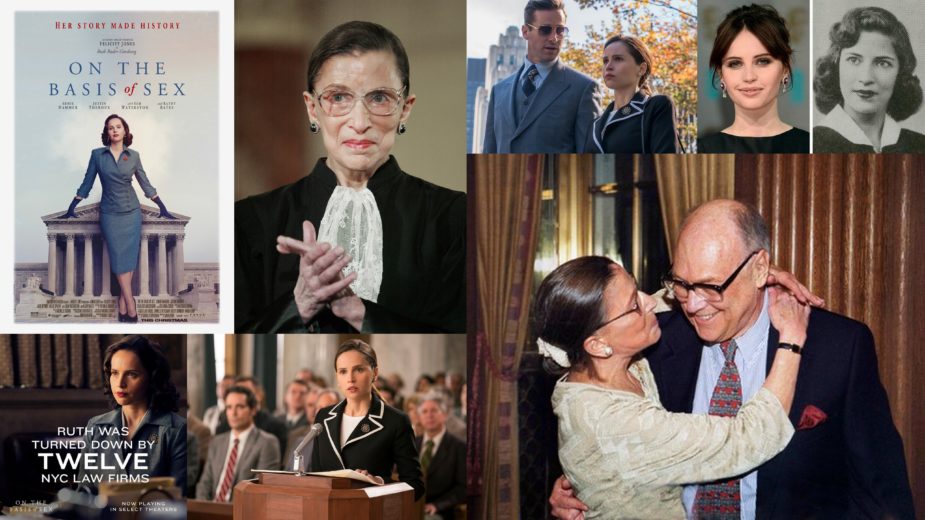
|
Mon, 28 May 2018
~The Simple Sophisticate, episode #210~Subscribe to The Simple Sophisticate: iTunes | Stitcher | iHeartRadio | YouTube“It is always the simple that produces the marvelous.” – Amelia BarrYou react in anger when a moment of frustration arises only to have to take more time (once you realize you shouldn't have reacted in such a way) to apologize and rebuild a relationship. The best decision, the simple decision, would have been to say nothing at all in the moment, step away from the situation, and decide what, if any, response was necessary. In a hurry to clear your inbox, you scan through emails too quickly, miss important details and end up having to respond twice or three times to correct the initial response. In an attempt to create a relationship, you cling or hang on to someone who doesn't fully welcome you into their lives. The simple truth regarding relationships is if people want you in their lives, they will make room for you and not create guessing games, just as you have opened your life to them. There are many ways we can complicate our lives when it is absolutely unnecessary to do so. While we often hear that we must struggle in order to reach the goals we desire, while there is much truth to the duration, there are many details along the way that do not have to be complicated. In fact, to complicate them, discourages our journey toward success. I was reminded that even those who value simplicity in order to elevate our lives (me!) can make the mistake of creating complication where they need not be. Over the past month I have been putting off a task that I knew in my good conscience needed to be tended to do. The delaying only built up more stress and fear that would have been assuaged or negated had I simply took action, discovered what the solution was and put my energy toward reaching the solution rather than putting my energy toward stressing out about the unknown. Often we complicate because we don't want one more thing to fill our plate. Ironically, we are putting more than one more thing on our plate; we are at least putting two: the task that needs to be tended to and the worry that we expend wondering. In other words, we accrue interest, and in this case, not the good kind. Today I'd like to take a look at 1o simple ways we unnecessarily complicate lives with the goal of avoiding these mistakes. Because once we recognize our mistake, we can simply correct our course. 1. Small, regular steps, to reach great successWhen we see our goal at the end of the long journey, there is a natural assumption that a grand step must be made. And while, yes, the distance is long, the journey is simple. So long as you are clear about what needs to be done and break it down into mini tasks, then all you have to do is the daily tasks each day on a regular basis. Whether it comes to improving your health, saving for your dream trip or earning the degree, be clear about your plan and then let go of the longview and trust that your daily habits will carry you to where you wish to arrive. 2. Contentment is in our control"It's only when you add the infinite battles of yesterday and tomorrow that life gets overly complicatd."—Getting Back to Happy, Marc & Angel Chernoff Much of the world would have us believe that contentment lies outside of us. Described as happiness, in a semantic sense, I would agree - happiness does lie outside of us, but contentment is entirely within our control. And it is through understanding how to cultivate contentment that we are more available to appreciate moments of happiness. But because we focus on what is outside of us - what must happen that involves others, what they should do, who should be in our lives, etc. we give our power away. Simply, our power for contentment, everything we need, is in our control because it is a matter of the mind. Ahd when our mindset is in order, we become at peace with ourselves and more engaging and charismatic with the world, drawing to us what we most love and appreciate. 3. Sleep Well, Live WellWhen I think about going to bed each night, I smile. I smile because my bed is soft, comfortable, and a true luxury to slip into after each day. Sleep is good. In fact, sleep is vital to living well. From how well our brain functions, to improving our health as the toxins are flushed from our bodies, to improving our mood, sleep even supercedes exercise. So protect your 7-8 hours of sleep each night and see the quality of your days improve. 4. When we complain, we aren't problem solvingIt is easy to complain and it is very tempting. And while we do need to vent because often we don't know what we are truly upset about until we release the frustration either verbally or on paper, complaining is a waste of energy as it takes away the precious time and brain power that is needed to either solve the problem or move on to something that better uses our time. 5. Learn to say no - focus your attentionFor nearly ten years, my focus has been my passion that is shared every week here on this blog. I continue to follow my intuition, trust that it knows what I cannot see at that moment and keep striving forward to inspire readers to have the confidence to reach their full potential, to shed the limiting views and societal confinements that would hold us back when what the world needs is what we each can uniquely give if only we could unearth it and share it with the world. In so doing my life has taken on its own construct: my daily and weekend schedules are full but much enjoyed, the sights of the world I have had the opportunity to see fill me with inspiration and I continue to arrive closer at understanding how living well, the art of living well, actually works. Because I know precisely why I am continuing to pursue my goal, saying no is quite simple. Whatever you are passionate about, whatever you discover gives you purpose, a deep, driving purpose, once you hone in on it, saying no is simple and the complications that arise from saying "yes" much more than necessary lifts. 6. Feeling loved, begins with loving yourselfThe love stories depicted in cliched rom-coms or traditional fairy tales would have us accept the love we seek resides outside of ourselves. The truth is actually the reverse. As we flip this notion on its head, it sounds too simple, too on the nose to be true, but the truth is you have had the love you have been seeking all along. We cannot truly find someone to love us well if we do not know how to love ourselves. And in order to love ourselves we must get to know ourselves, and when we show the world the self-respect we have for ourselves and thus the world, we attract to us those who appreciate who we are and thus opportunities for quality and lasting, loving relationship. For many, the complicated part lies in understanding how to love ourselves because doing so has been conveyed as being selfish. Once we see someone around us who exhibits self-love, we come to understand that self-love is a form of self-respect and when we respect ourselves we protect ourselves and strike a balance between what we can give to others and what we need to keep to give to ourselves whether it is our time, our energy, or our patience. 7. Reduce excess decision makingFrom the clothes you wear each day (create a capsule wardrobe), to the flavor/varietal of tea/coffee you drink to start your day, once you know what works for you and if it a foundational decision that needs to be stable so that the other tasks you go about doing throughout your day will be successful, stick with it. During my work week, I drink black tea or green tea. There are many amazing teas to drink, but to ensure the foundation of the start of my day is sturdy I drink tea I know I will enjoy. It's not that I won't try different teas when I travel, enjoy brunch on the weekend, etc.. All it means is that too often we choose coffee to try something new (as a tea drinker) on a work day that needs are focus. And if the coffee does not sit well with us, we just complicated our day unnecesarily. 8. When we worry, we waste our days awayWorry is a depletion of two precious commodities - our energy and our time. As I shared a few years ago, there are many benefits to be had when we banish worry (20 to be exact). And one priceless benefit is a return to a simpler way of living and thus improving of our everyday lives. As I shared as the #1 of the linked post, often it is the "how" to banish worry that is hard. So let me share with you a four-step process you can follow to just that - banish unnecessary worry - (1) write down exactly what you are worried about, (2) write down what you can do about it (3) decide the best course of action (4) start immediately to fulfill the course of action you’ve decided upon. In other words, action is the choice you want to take when you don't know what the outcome will be, rather than worrying. 9. Tell the truth (about what happened and who you truly are)"If you tell the truth you don't have to remember anything." — found in Mark Twain's notebook, 1894 On a surface level, as Twain points out, when we tell the truth, we don't have to remember which story to whom, but on a much deeper level, when we tell the truth about who we are and reveal to the world who we actually are, we do not draw to ourselves those who think we are someone else. In other words, not everyone will be drawn to us in our authentic state, but those who are are individuals with whom we have a far greater chance of connecting in such a way that has the opportunity to last, deepen and lift each party involved to their fullest potential. 10. Respond rather than react As I shared in the introduction in one of the examples of unnecessary complication, when we react, our emotions have us by the throat, but when we respond (while it may take more time), we are being thoughtful and inviting logic to join the conversation so to eliminate having to make apologies later. The key to living simply throughout our everydays is to make sure where we can simplify, we are. Because when we reduce the complications that need not be in our lives, we open up vast, beautiful windows for the opportunities we seek to introduce themselves. ~SIMILAR POSTS FROM THE ARCHIVES YOU MIGHT ENJOY: ~Why Not . . . Uncomplicate Your Life? ~Mastering the Complexity of Simplicity ~13 Benefits of Seeking Out Quality, episode #174 ~The "How" of Tailored Simplicity Petit Plaisir:~Getting Back to Happy: Change Your Thoughts, Change Your Reality and Turn Your Trials into Triumph by Marc & Angel Chernoff
~SPONSORS of Today’s Episode:
|
Mon, 5 February 2018
~The Simple Sophisticate, episode #194~Subscribe to The Simple Sophisticate: iTunes | Stitcher | iHeartRadio | YouTube |
Mon, 10 July 2017
~The Simple Sophisticate, episode #163~Subscribe to The Simple Sophisticate: iTunes | Stitcher | iHeartRadio
"Growing your inner strengths through taking in the good is like deepening the keel of a sailboat so that it's less jostled by the worldly winds, it recovers more quickly from big storms, and you can now safely head out into deeper waters in pursuit of your dreams." —Rick Hanson, author of Hardwiring HappinessThe founding premise of the book Hardwiring Happiness is change your brain, change your life for the better. Having discussed this fact before on the blog/podcast, it may not appear to be profound on the surface, but what always keeps me reading is how do we change our brain to change our lives for the better, how does it actually work neurologically? And the how is exactly what made the most sense to me above any other book I have read upon reading Hardwiring Happiness. Simply put, we need to deeply savor the good that occurs in our lives, the small as well as the overtly large and as we do, we begin to build new synapses into our brain, enabling it to expect the good rather than spontaneously always looking for the bad. The skill that we all need to develop, practice multiple times a day and then use habitually is to take in the good. What is meant by this is a four step process which Hanson outlines in his book, but essentially it is to be present in your life, to be engaged, to be paying attention, and thus, to recognize, and then savor those moments, no matter how small or large, that are good. "By taking just a few extra seconds to stay with a positive experience you'll help turn a passing mental state into lasting neural structure . . . the practice brings you into the present moment and teaches you to have more control over your attention." Did you wake up and feel rested? Savor this moment for 10 more seconds and let it truly be absorbed by your mind. Did you receive a loving gesture from your partner? Slow down and savor it, engraining into your memory to be appreciated even after the moment has passed. Did you feel safe in your home last night? Tip your hat to the world you have created and take a deep breath to again welcome even more appreciation of the fact into your being. An analogy (and he uses an abundance of them throughout the book which I found quite helpful) Hanson uses to describe the three step process of rewiring the brain is comparing it to making a fire: "Step 1 lights it, step 2 adds fuel to keep it going, and step 3 fills you with its warmth." He also further explains that often step 2 & 3 overlap which makes sense because you can adding wood to the fire to keep it going as you are remaining warm. To repeat the steps (notice the acronym - HEAL):
All of this may sound overly simplified, but after reading and coming to understand how the brain works, how it creates paths of memory and why it has evolved the way it has, Dr. Hanson, who is a neuropsychologist, demonstrates that it is in the daily routines and the daily tracks we allow to run through our mind that create a happier, I like to use the word contented, way of living every single day not matter what is going on outside of us. Why? Dr. Hanson dives deeply into this, but a basic synopsis is "In a positive circle, feeling better helps you act better, which helps the world treat you better, which helps you feel better." And on the flip-side, if we continue to let negative events run through our minds and become absorbed by them, we are making tracks in our mind, strengthening synapses that reinforce the need to be on the look out for negative and thus reactive rather than responsive which I detailed in episode #145 of the podcast. In fact, Dr. Hanson points out due to our ancestral need for survival which actually impedes our way of life in the 21st century, our brain is designed in such a away that "negative stimuli are perceived more rapidly and easily than positive stimuli". In other words, "the default setting of the brain is to overestimate threats and underestimate opportunities and underestimate resources both for coping with threats and for fulfilling opportunities". Which is why, it requires a conscious effort to rewire the brain to be less fearful and more positive seeking, and if we do nothing, the above hereditary scenario will persist throughout the duration of our lives blocking us from attaining our full potential. Knowledge of how the brain works is power. And upon reading the book, if further understanding of the most powerful tool in your body is of interest to you, you will appreciate this book and how he delivers the information. Let's talk about the "how" of savoring the good moments, both enriching them and absorbing them. 1. Slow down In order to recognize when a good moment has occurred, we need to slow down. At that time, take 10 more seconds to just fully observe, imprint in your memory what is going well. 2. Become fully aware of what surrounds you Being present in the now will help you to be fully aware of all that is going on, all that is going well and even if certain things are not, because you are fully aware, you can put it into perspective, bring forward the good and ratcheting down the not so good so that it doesn't become more inflamed than it needs to be. 3. Strengthen emotional intelligence There are many components to being emotionally intelligent (I go in detail in episode #140), but the key component to rewiring your brain is to be able to identify your emotions and what you are feeling accurately. And then once you understand what you are feeling, if it is a positive feeling, you can grow the feeling into a mood - for example as Dr. Hanson points out, you can grow a feeling of gladness and gratitude into a mood of contentment. Conversely, if you recognize you are feeling sad about something, you can combat the feeling from developing into a mood of depression simply by recognizing what you are feeling, why you are feeling and combating it by shifting your mind and even your environment to a positive scenario so that your mind doesn't become fixating on something that isn't productive or helpful. 4. Instead of wanting, choose to like or appreciate the moment Often we are fully aware that a moment or an experience is exponentially good and because we know it is good, we want more of it. But by wanting, as Hanson points out, we aren't experiencing what is going on right now. We are removing ourselves from the situation and acting in such a way that reveals we unconsciously feel we lack something, thus the "want". In fact, our "want" is killing any growth of more goodness. Instead, be present, enjoy what is occurring, appreciate it for what it is without cajoling to trying to make more and relish what you have the opportunity to be amongst. As I have learned upon bringing more appreciative and secure people into my life, is that when such beautiful moments happen, I can take that moment with me in my memory so long as I savor the experience and allow my memory to absorb it fully and then replay it whenever I need to to brighten my future days. Again, more is not better, simply deepen what you are given by following the three step process: have a good experience, enrich it/savor it and absorb it/commit it to memory. 5. Give yourself permission I recently was listening to Christopher Kimball's Milk Street Radio podcast, and he was interviewing Nigella Lawson who stated on the topic of guilty pleasures, "Look, if you feel guilty about pleasure, you don't deserve to have pleasure." Back in 2013 I wrote a post about the difference between pleasure and joy, and while one is not bad and the other good, knowing where each is derived is important. However, with regards to rewiring the brain, anytime we observe and experience a pleasure, we can turn the pleasure into joy which is something entirely within our own control. For example, I pulled an excerpt from the post mentioned above. Here is a list of how to welcome more joy into your life, and upon doing so, you can make all of these moments opportunities to rewire your brain as you shift to a more contented way of living each and every day. 1. Look inward – become at peace with who you are, and celebrate your uniqueness. 2. Take time to meditate, pray and be still. 3. Allow external inspiration (art, nature, music, conversation) to stir your inner creativity, and act upon those moments of inspiration – create, dream and act according to what is provoked within you. 4. Figure out your purpose/passion and then go pursue it 5. Be thankful for what you already have, rather than what you lack 6. Give when you have the resources, time and energy to do so 7. Pursue avenues/dreams that are meaningful and align with your values 8. Plan activities that cultivate more moments of joy – simple meals, gatherings, events that you are curious about, etc. The conclusion of Hardwiring Happiness that drove the point home for me of choosing to take on the task of changing the hardwiring my brain (because initially it will have to be an entirely conscious choice) was the realization that when we shift away from seeking more happiness and running or trying to avoid pain, we come to recognize that we have the ability to be content wherever we are at any given moment. We have that power. We do not have to chase it, we don't have to run from what we perceive as bad moments. Because as we begin to live more consciously, as we begin to focus on the good, take it in fully and commit it to memory, we begin to build a life that snowballs in the best of ways. The cycle that was mentioned above strengthens and we attract people, moments and environments that are full of goodness to appreciate because we are someone who brings and cultivates moments of goodness in our lives and those around us. "Taking in the good is not about chasing after pleasure or chasing away pain. It's about bringing the chase to an end." ~SIMILAR POSTS FROM THE ARCHIVES YOU MIGHT ENJOY: ~How to Be the Master of Your Mind ~11 Ways to Live More Mindfully ~From Seeking Happiness to Cultivating Contentment: A Shift in What We Pursue (podcast)
Petit Plaisir:~The perfect simple and delicious appetizer for summer: Melons & Prosciutto (cantaloupe & cured ham)History: An Italian antipasti favorite, dating back to the second century, it was Galeno, a doctor during this time who believed that the combination of these two ingredients was the perfect way to incorporate the four things a being needed to feed what he believed each human was made of - warm, cold, dry and juicy corresponding to the four elements fire, air, earth and water. The melon was cold and juicy and the cured ham was dry and warm (salty and cured). Learn more here. ~The other appetizers are Tangy Cucumber Bites (recipe here) and figs with chèvre.
All images via TSLL's Instagram & IG stories SaveSaveSaveSave |
Mon, 3 July 2017
~The Simple Sophisticate, episode #162~Subscribe to The Simple Sophisticate: iTunes | Stitcher | iHeartRadio |
Mon, 19 June 2017
~The Simple Sophisticate, episode #160~Subscribe to The Simple Sophisticate: iTunes | Stitcher | iHeartRadio
"'How does one become a butterfly?' she asked pensively. You must want to fly so much that you are willing to give up being a caterpillar." —Trina PaulusIn a blink of an eye, in an unexpected, ordinary moment, the unimaginable can materialize before our eyes. And in such a moment, due to its magnificence, a feeling of surreality washes over us and we stand confounded, yet buoyant as it feels we've reached the surface finally after much hard work, planning, and hoping what seemed against hope. Butterflies have always been a source of spontaneous glee for me. As I shared more than six years ago, spotting a butterfly is a reminder: “This was what the struggle was all about. Now you have the knowledge. Now you know how to fly on your own and reveal your gifts to the world without disguising yourself to fit in.” Much like the people that come into our lives and the opportunities that cross our paths, we cannot know when the butterfly will metamorphosize from the stage of being a caterpillar. Two weekends ago, we decided to go paddle boarding, and along the way, the butterflies began to dance around me. Like a child giddy at the sight of a new puppy, I all but tap danced on my board. As we continued to paddle, I noticed they were puddling, and it seemed endless butterflies were all clustered at this one wet, muddy puddle area on the side of the river. Never before had I been surrounded by so many fluttering wings, paying me no mind and going about their nutrient gathering behavior. ~What Butterflies Have Taught Me ~Why Not . . . Trust the Timing of Your Life?
Petit Plaisir:~Paris Can Wait, starring Diane Lane, directed by Eleanor Coppola~View theaters and times here~If you are in Bend, it plays at the Tin Pan Theater through this Thursday June 22nd. Over the weekend, the small boutique theater in Bend brought to its small screen the film written, directed and produced by Eleanor Coppola. Yes, that Eleanor Coppola, wife of Francis Ford Coppola (The Godfather series, The Outsiders, etc.) for 54 years. Debuting at the Tribeca Film Festival this past May, Paris Can Wait is Eleanor's first narrative feature film, but you wouldn't have known. Now, not all the critics are loving it: The Boston Globe felt it was strained and relied too heavily on clichés, even those who thought they would love it came away unsure due to the ambitious ending, but it is precisely the different approach to making the film that makes it lovely. Coppola has shared that the film's plot was inspired by her own life (be sure to read the San Francisco Chronicle's interview with her here), but not every piece and parcel of the story (there was no male companion). Along with the struggle Diane Lane's character (Anne) wrestles with is what Coppola herself did as well, the "'inner conflict, the push and pull' she’s felt her whole adult life about pursuing her own creative ambitions while raising three children and supporting her husband’s career". As well, both women (the character and Coppola) have suffered the loss of a child which is briefly, but touchingly included in the film. Some readers have shared with me, they didn't enjoy the insinuation of infidelity, but I think that may be taking it further than Coppola intended as nothing occurred, merely adoration and a woman (Anne) who was keenly aware and steadfast. What Anne's journey does do for her is awaken her to her strengths, to her passions, to the realization yes of her imperfect, but still very adoring husband. And by not giving viewers the concrete ending, leaving us wondering, Coppola does something I must applaud her for: She doesn't tell us how to think. As someone who has been immersed in Hollywood due to her husband, then daughter and son's successful involvement with silver screen productions, she doesn't fall prey to the formula. Maybe she does have a sequel in mind, but I hope not only because this film, as she has stated, took six years to raise funds as it wasn't full of "aliens, nobody dies, there are no guns and no car crashes. There was nothing that an investor wants to invest in. No sex, no violence". Rather it was a piece of her life she wanted to share and explore, and in so doing, she allows the viewers to ponder what we don't often see in movies: a leading female role who is complete all by herself so long as she embraces her passions, lets herself feel what she feels, appreciates her allure which may be initially noticed due to her beauty but is profoundly powerful and substantive due to her intellect and character. And whether or not she remains with her husband (who isn't perfect) or explores her attraction to Jacques, played by Arnaud Viard (who also isn't perfect or ideal either) shouldn't be needed for a happy ending. What the happy ending is is liberation for Anne who hears the reminder from Jacques to share her talents with her husband (and perhaps the world if she so chooses), and to savor the pleasures of everyday moments and food without rushing to Paris. |
Mon, 21 November 2016

"As long as one keeps searching, the answers come." —Joan BaezLife in many ways feels as though it is a treasure hunt. However, I have good news. If my experience is any evidence, Joan Baez's quote above certainly rings true. Case in point, stumbling across British philosopher Bertrand Russell's book The Conquest of Happiness. I happened to have been perusing in my local bookstore, stopping in to pick up another book that I had ordered when I came across the simple bright yellow cover of The Conquest of Happiness. Mind you, the copyright is 1930 and as the new introduction, written in 2012, by philosophy professor at Tufts University Daniel C. Dennett reminds, Russell's views while quite progress at the time clearly leave laid bare his ignorance about women and minorities. However, these should be set aside as we look through the lens as though he is speaking about all people, because what he reveals gave me reason to take a deep breath of appreciation. As Russell reminds straight-away with his title, happiness is something we must cultivate. It is not something that we are born with. Now, this is not to say that we are born unhappy, no, absolutely not. However, we are born, each of us, into a culture and world we did not choose. We must come to understand our place in it, understand the capabilities that are innately ours and how to offer them to the world all the while protecting ourselves and vulnerable heart. Russell offers wise words about what we can and cannot do. What is true and what we should let go of as once assumed as true along the path to attaining happiness and identifying what we think is causing our unhappiness. I have gone through and found 38 points he shares that through welcoming as either habits, practices, approaches or shifts in our thoughts and beliefs, can usher in a true happiness we may have never thought attainable. First: Determine what you most desire Then . . . 1. Diminish your preoccupation with yourself (stop meditating on your perceived sins and shortcomings) 2. Focus primarily on external objects: the state of the world, attainment of knowledge in a variety of avenues, and individuals for whom you feel affection. 3. Practice moderation 4. Aspire to be interested in a variety of things; the more opportunities for happiness you have, the less you are at the mercy of fate since if you lose one thing you can fall back on another. 5. Even when an unexpected negative event takes place, understand that it too can give pleasure. How? Appreciate the knowledge you have gained to better understand the world and reduce unnecessary fear. 6. Bolster your energy so when you have free time you can pursue what interests you without restraint. 7. Vow to have a zest for life, an incessant curiosity. 8. Understand this truth, affection is given to those who least demand it. 9. Those who face life with a feeling of security are much happier than the contrary. 10. You are more likely to realize what you fear by believing it. 11. Self-confidence comes from being accustomed to receiving as much of the right sort of affection as one has the need for (healthy, non-dependent, etc.) 12. A person who is hardy and adventurous can endure a great deal without damage. 13. The best type of affection is reciprocally life-giving: each receives affection with joy and gives it without effort, and each finds the whole world more interesting in consequence of the existence of this reciprocal happiness. 14. Affection, in the sense of a genuine reciprocal interest of two persons in each other, not solely as means to each other's good but rather as a combination having a common goal, is one of the most important elements of real happiness. 15. A capacity for genuine affection is one of the marks of someone who has escaped from the prison of one's self-absorption. 16. Of all forms of caution, caution in love is perhaps the most fatal to true happiness. 17. One must cultivate external interests that bring rest and do not call for any action, rather allow you to simply enjoy. 18. Never ignore opportunities to gain knowledge. 19. Contemplate what makes greatness of one's soul. When one is capable of greatness of soul, it will open wide the windows of the mind, letting the winds blow freely upon it from every operation of the universe. 20. During times of grief, loss or pain, turn towards something that is not the source of anxiety. (This is where having many, varied interests comes in quite handy). 21. One cultivates happiness and therefore must find ways of coping with the multitudinous cause of unhappiness. By choosing to unearth the answers, happiness expands. 22. Happiness is an achievement, not a gift. 23. Do your best (effort) and then leave it up to fate (resign). 24. Having an unconquerable hope means it must be large and impersonal (hopes for humanity and being okay with the progress made, no matter how small even if the goal wasn't reached yet). 25. Let go of worry, fret and irritation as they serve no purpose. 26. In times of quandary, it is better to do nothing than to do harm. 27. A certain kind of resignation is involved in the willingness to face the truth about ourselves. 28. Nothing is more fatiguing than to believe things that are only a myth or false. 29. Happiness requires food, shelter, health, love, successful work, and the respect of one's own herd. 30. Fear is the principal reason why humans are so unwilling to admit facts and so anxious to wrap themselves round in a warm garment of myth. 31. Accepting facts and truth is a way to tackle fear and reach true happiness. 32. The happy person is who lives objectively, who has free affections and wide interests, who secures her happiness through these interests and affections and through the fact that they in turn make the person an object of interest and affection to many others. 33. The person who demands affection is not the person upon whom it is bestowed. 34. Don't think about the causes of unhappiness; get outside of it, it must be by genuine interests, not by simulated interests. 35. Once you let go of self-absorption, let the spontaneous working of your nature and of external circumstances lead you. 36. Only what genuinely interests you can be of any use to you. 37. Undoubtedly, we should desire the happiness of those whom we love, but not as an alternative to our own. 38. A happy person feels a citizen of the universe, enjoying freely the spectacle it offers and the joys it affords, untroubled by the thought of death because they feel themselves not really separate from those who will come after them. It is in such profound instinctive union with the stream of life that the greatest joy is to be found. While there is much to digest and contemplate, what left me with hope was the reality that so much of what causes us pain is self-inflicted. While yes, there are many things that are out of our control, understanding the difference is key, but so too is recognizing when we have played a role that has adversely obstructed us from potential happiness. Simply put, we need to get out of our own way, and this list will help us all to do just that. ~SIMILAR POSTS FROM THE ARCHIVES YOU MIGHT ENJOY: ~A Powerful Couple: Boundaries & Vulnerability (podcast) ~10 Things People Who Have Found Contentment Understand About Uncertainty (podcast)
Petit Plaisir—Paris-Manhattan~starring Alice Taglioni and Patrick Bruel (English subtitles) 
Image: source
Direct download: 131BertrandRussellHappiness_-_112016_4.01_PM.mp3
Category:happiness -- posted at: 12:00am PDT |
Mon, 18 January 2016
Today the differences between Strengths and Skills will be shared, along with the significant difference that will have a profoundly positive effect on your everyday life and the future direction you wish to go. In this week's Petit Plaisir, a simple and delicious skillet chicken recipe that includes the trinity of Italian cooking: basil, mozzarella and tomatoes. 30 minutes to yum! |
Mon, 3 August 2015
Inspired by Dr. Paul Dolan's book Happiness by Design, this episode will focus 30 specific ways to cultivate a happier life. Most importantly, as revealed by Dr. Dolan's book, the equation of what makes a happy life is discussed and from that point the remaining 29 tips are shared. In this week's Petit Plaisir, the book The French Beauty Solution is reviewed and recommended. |
The Simple Sophisticate - Intelligent Living Paired with Signature Style (happiness)

Categories
lifestylemoney
fashion
general
food
relationships
beauty
holidays
style
decor
etiquette
technology
dating
clothing
news
happiness
health
finances
self-help
feminism
french living
communication
inspiration
self-improvement
cooking
French-inspired
podcast
travel
entertaining
Archives
AprilMarch
February
January
December
November
October
September
August
July
June
May
April
March
February
January
December
November
October
September
August
July
June
May
April
March
February
January
December
November
October
September
August
June
May
April
March
February
January
December
November
October
September
August
July
June
May
April
March
February
January
December
November
October
September
August
July
June
May
March
February
January
December
November
October
September
August
July
June
May
April
March
February
January
December
November
October
September
August
July
June
May
April
March
February
January
December
November
October
September
August
July
June
May
April
March
February
January
December
November
October
September
August
July
June
May
April
March
February
January
December
November
October
September
August
| S | M | T | W | T | F | S |
|---|---|---|---|---|---|---|
| 1 | 2 | 3 | 4 | 5 | 6 | |
| 7 | 8 | 9 | 10 | 11 | 12 | 13 |
| 14 | 15 | 16 | 17 | 18 | 19 | 20 |
| 21 | 22 | 23 | 24 | 25 | 26 | 27 |
| 28 | 29 | 30 | ||||
Syndication

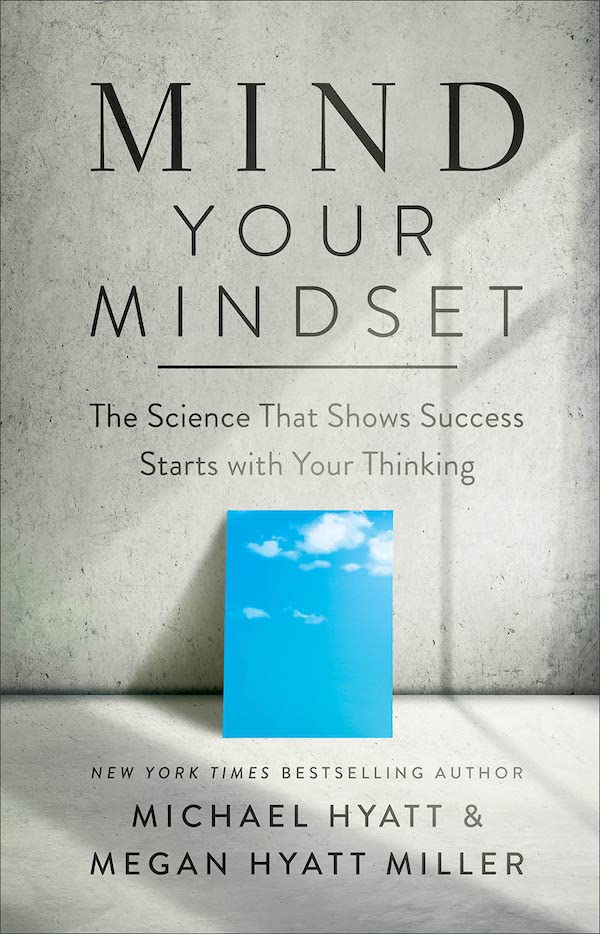




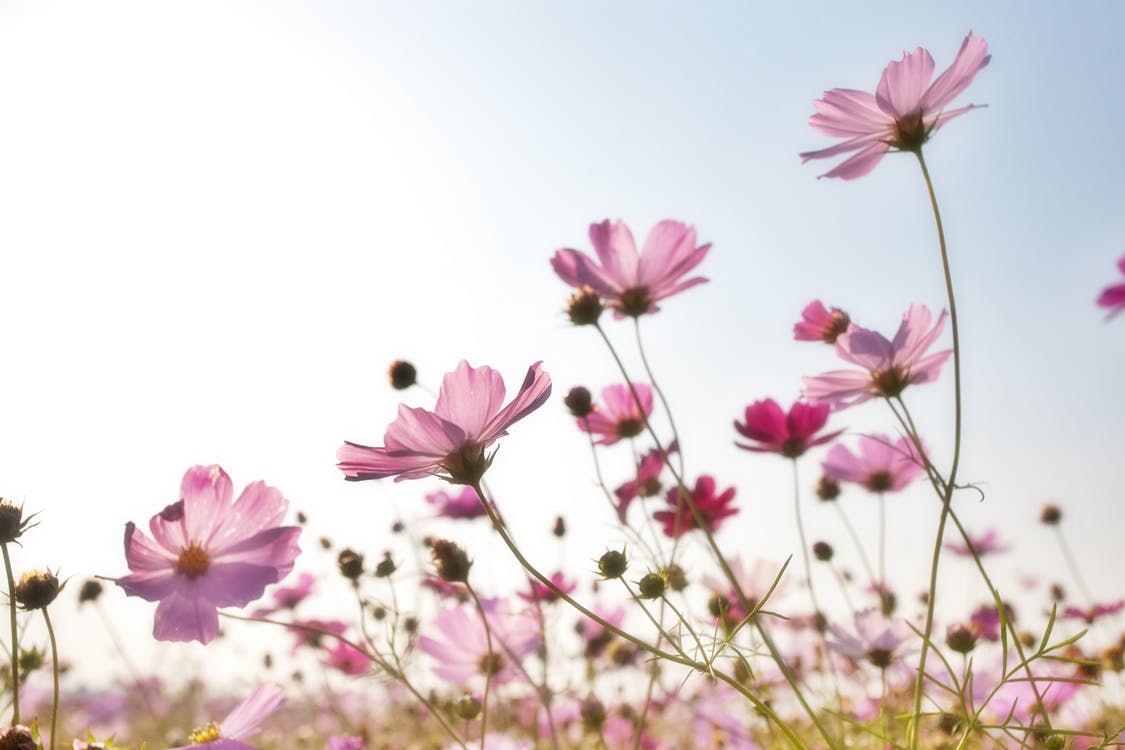
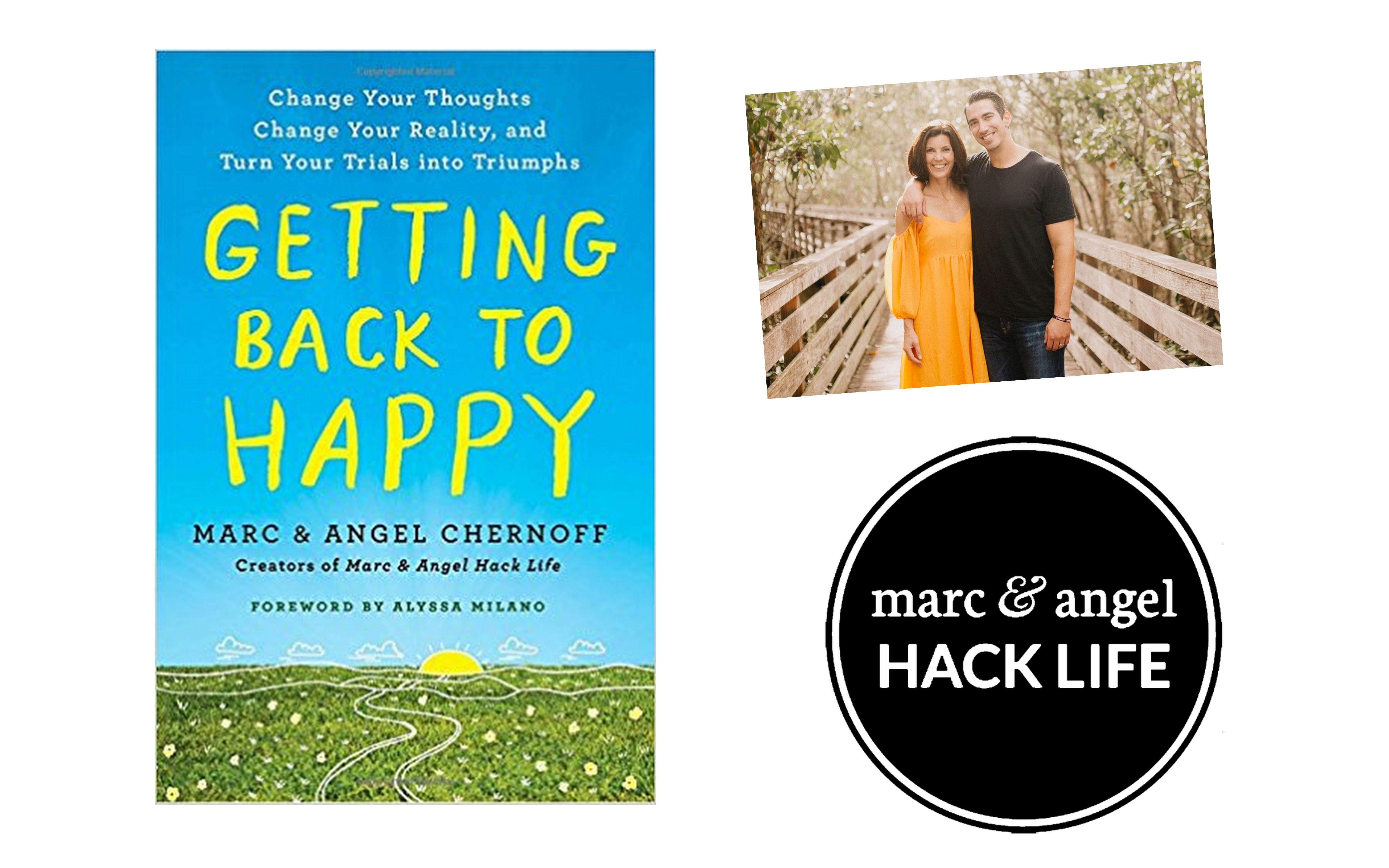
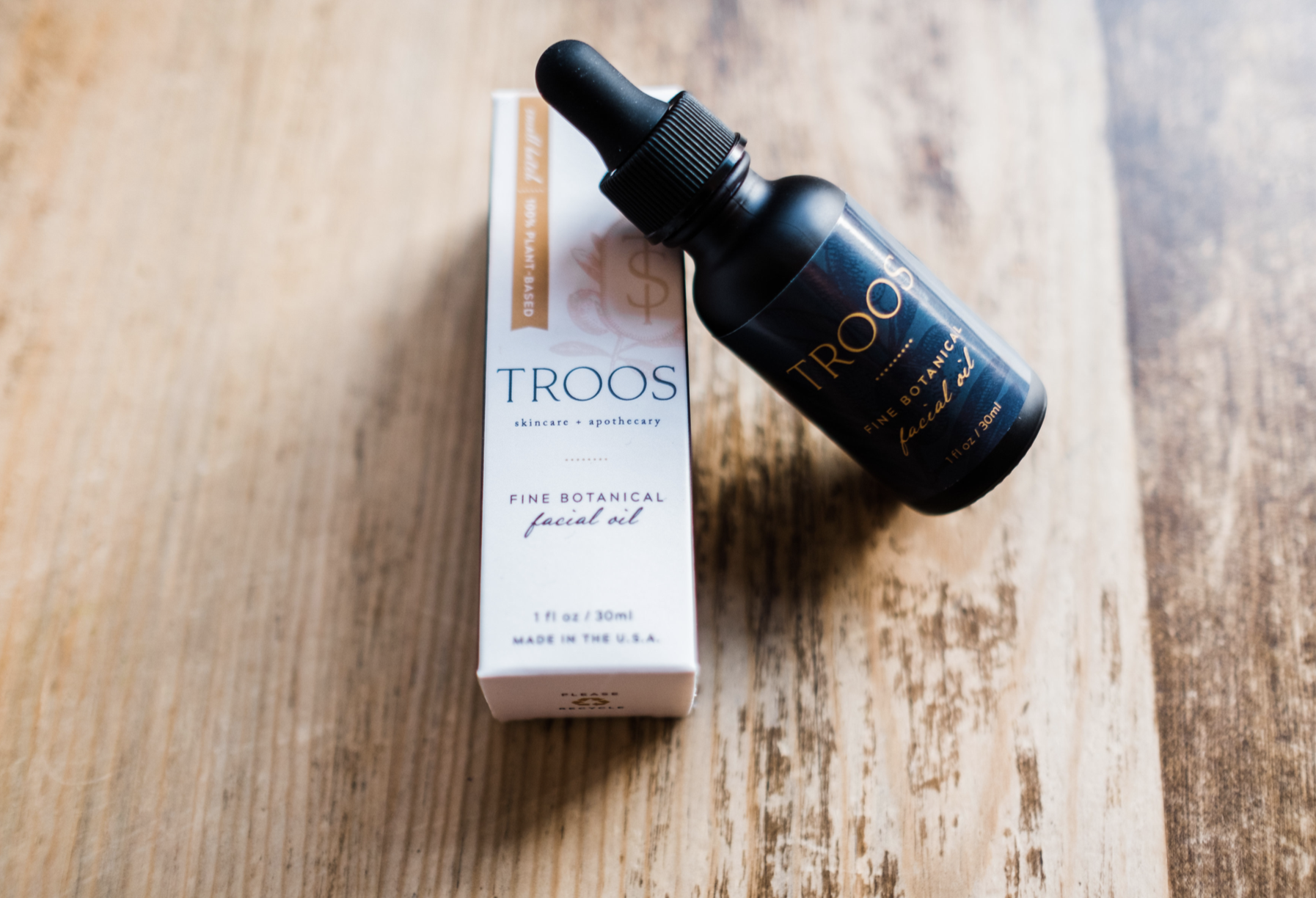


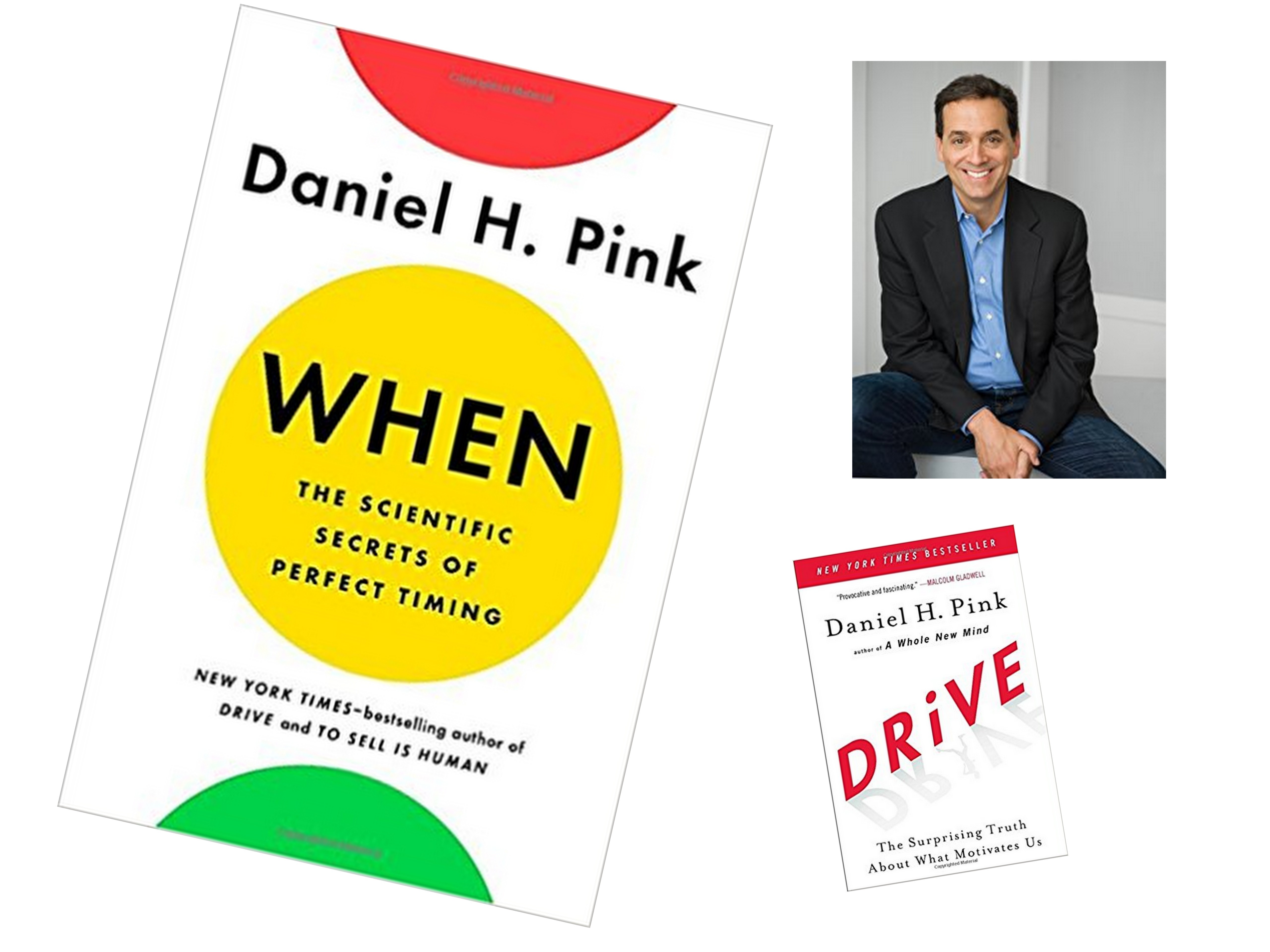
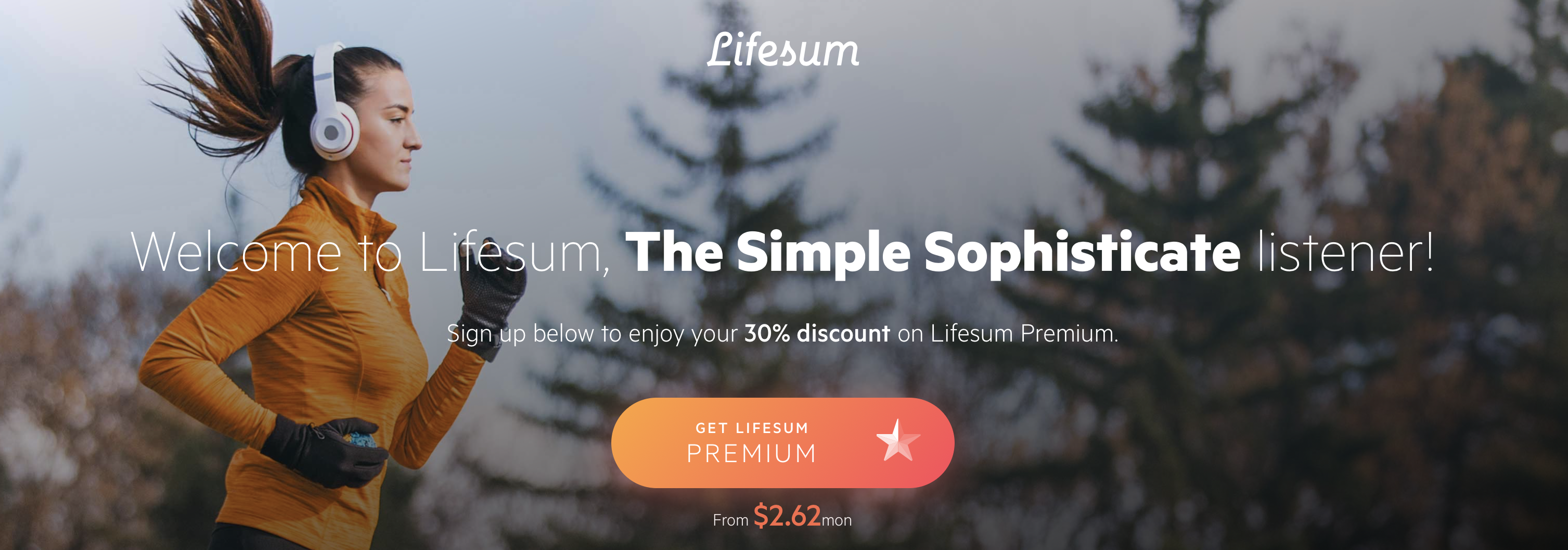
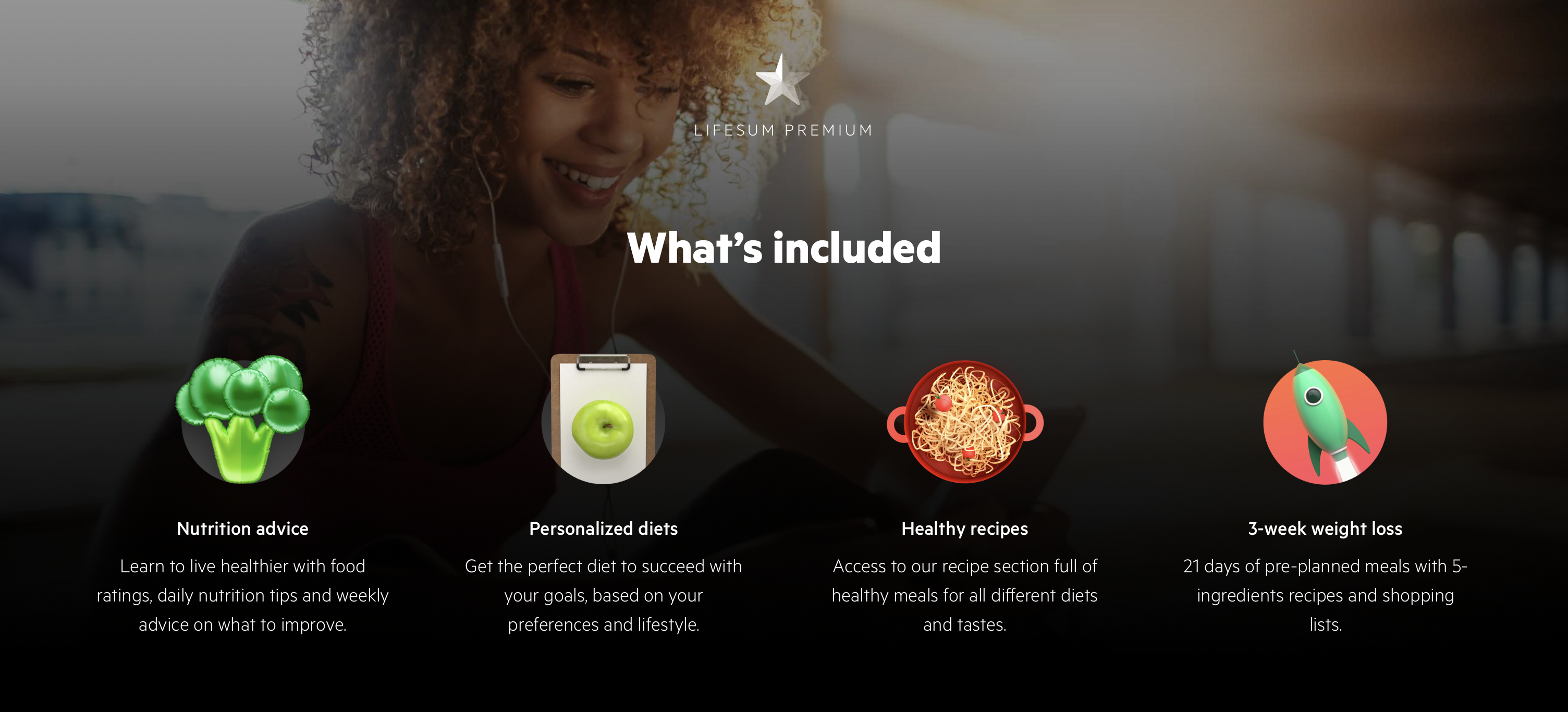
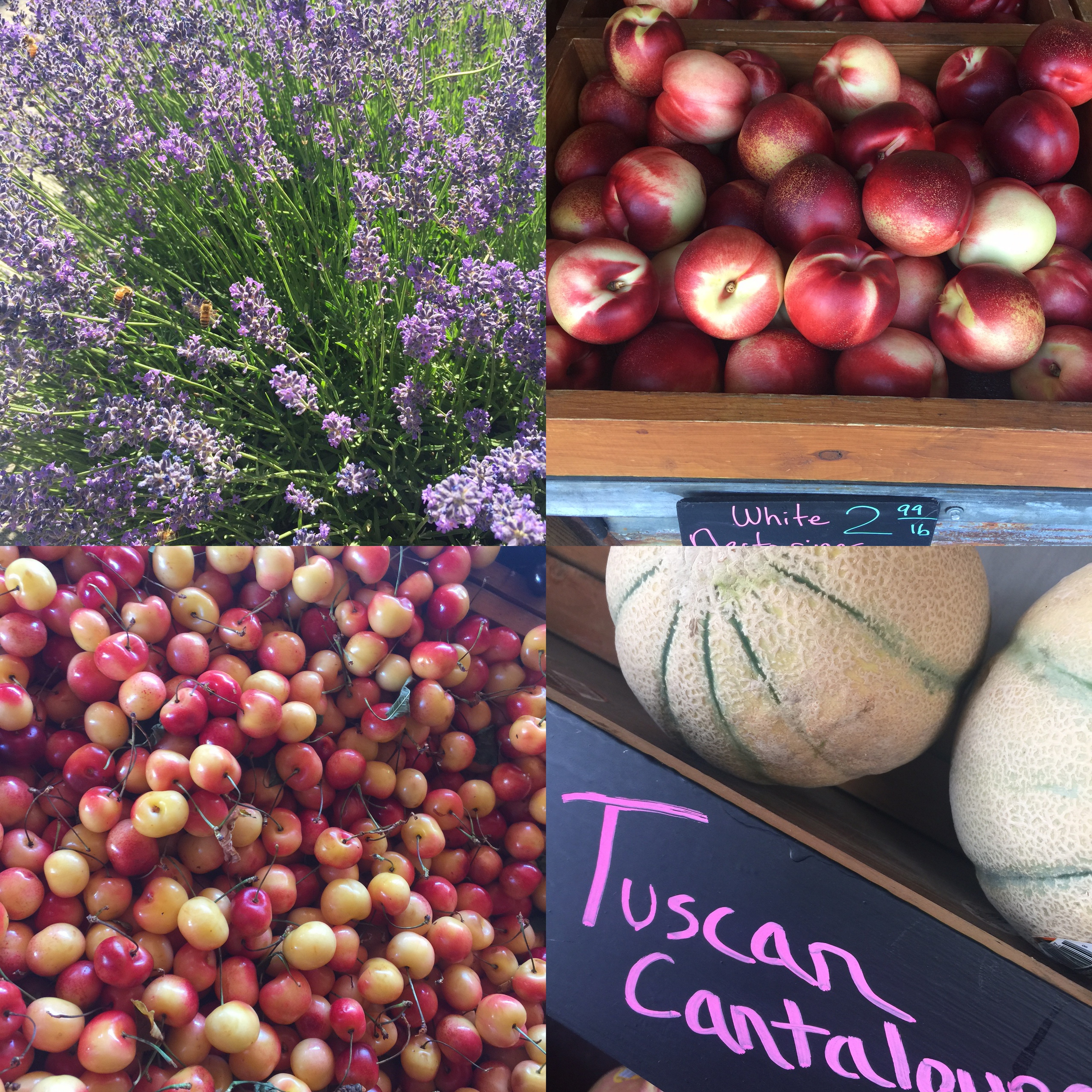
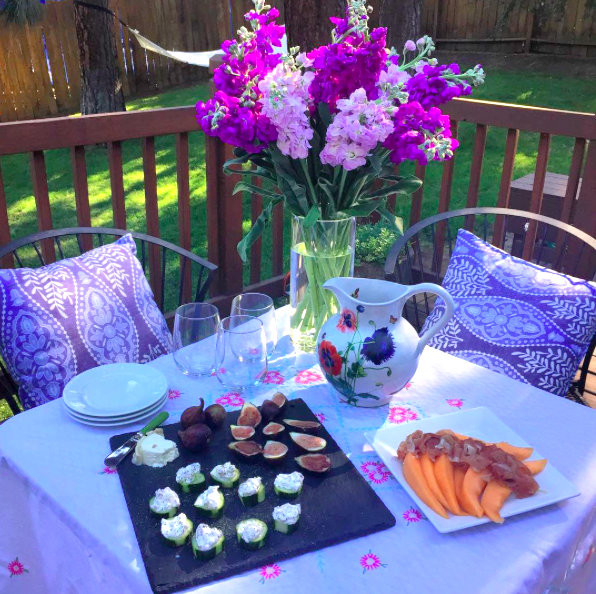
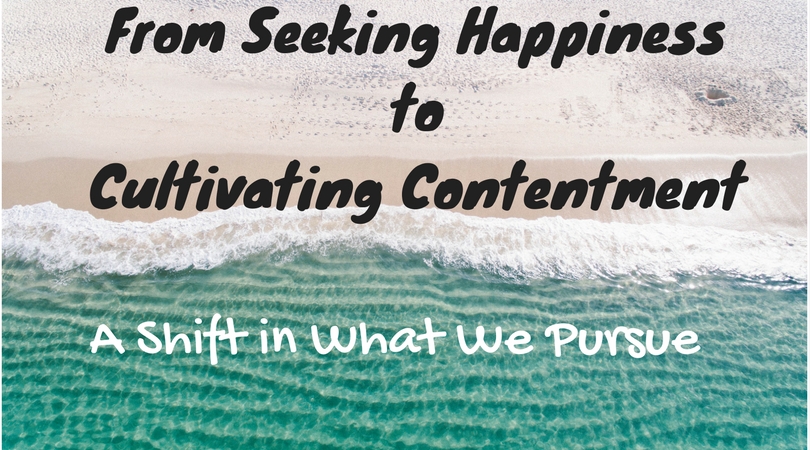
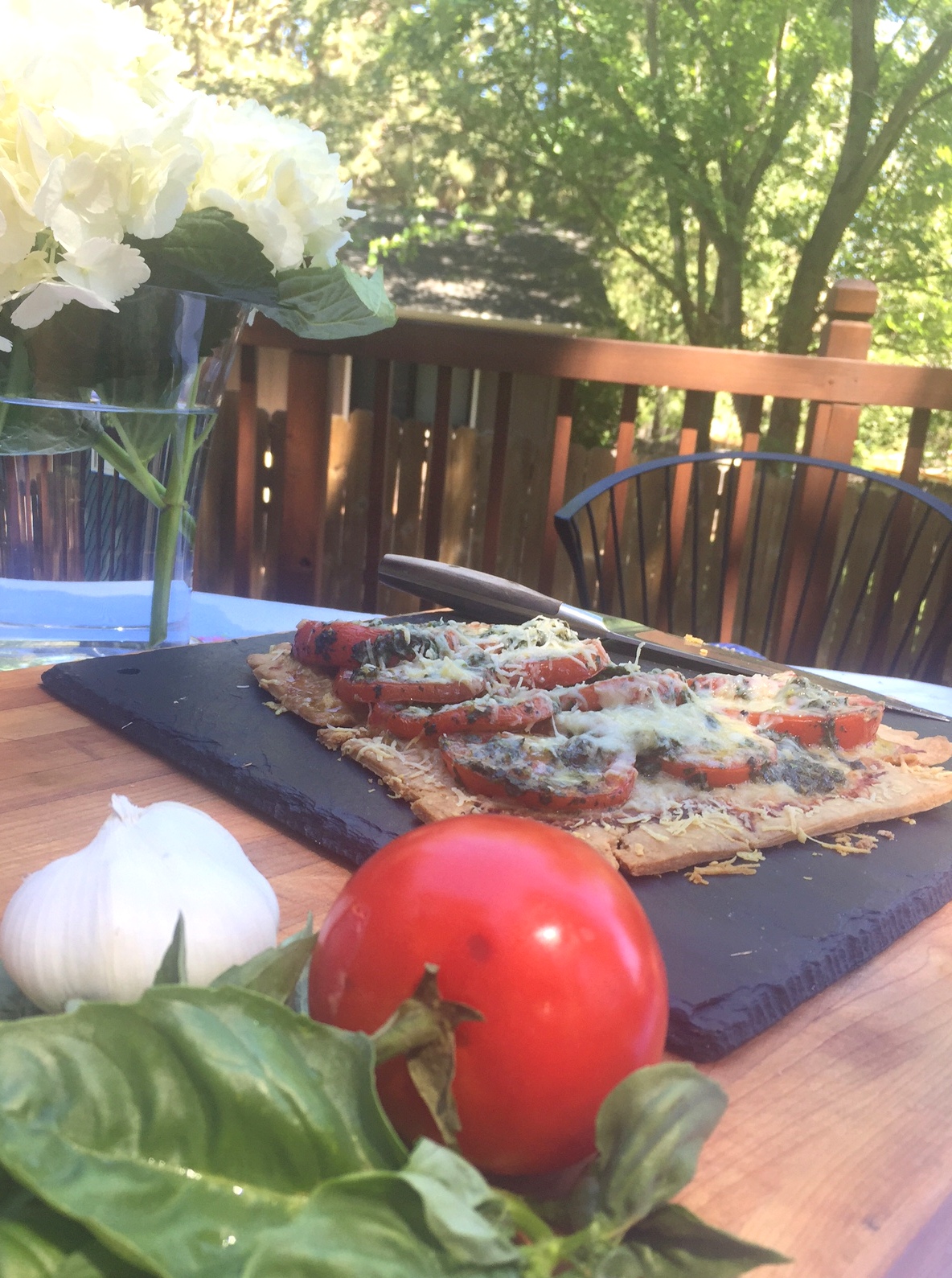
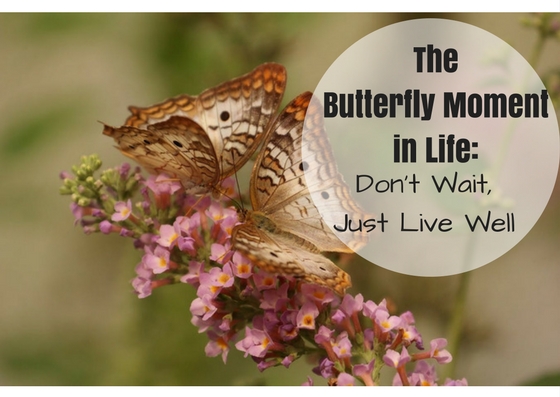
 Then again this past weekend,
Then again this past weekend,  Edith Wharton says it beautifully regarding when the moment you've hoped for will happen (the butterfly moment so to speak), "They seemed to suddenly come upon happiness as if they had surprised a butterfly in a winter wood." You truly cannot know when it will all come together, but at least you know you'll be ready to walk with it when it crosses your path. And it all begins with what the first quote at the top of the post brings to our attention, decide to let go of being a caterpillar, in order for your wings to break through and reveal themselves to not only the world, but to you. You may just be amazed at what is hidden in the depths of your being if only you would allow it to come forth. ~SIMILAR POSTS FROM THE ARCHIVES YOU MIGHT ENJOY:
Edith Wharton says it beautifully regarding when the moment you've hoped for will happen (the butterfly moment so to speak), "They seemed to suddenly come upon happiness as if they had surprised a butterfly in a winter wood." You truly cannot know when it will all come together, but at least you know you'll be ready to walk with it when it crosses your path. And it all begins with what the first quote at the top of the post brings to our attention, decide to let go of being a caterpillar, in order for your wings to break through and reveal themselves to not only the world, but to you. You may just be amazed at what is hidden in the depths of your being if only you would allow it to come forth. ~SIMILAR POSTS FROM THE ARCHIVES YOU MIGHT ENJOY: